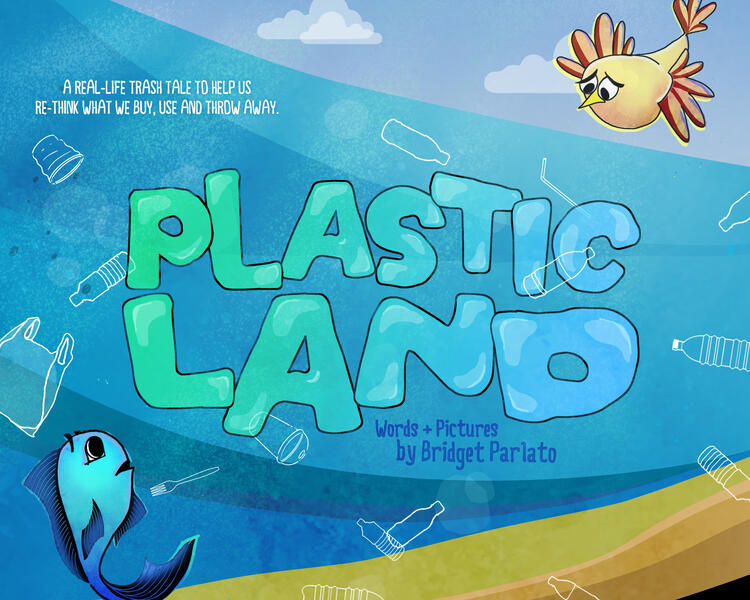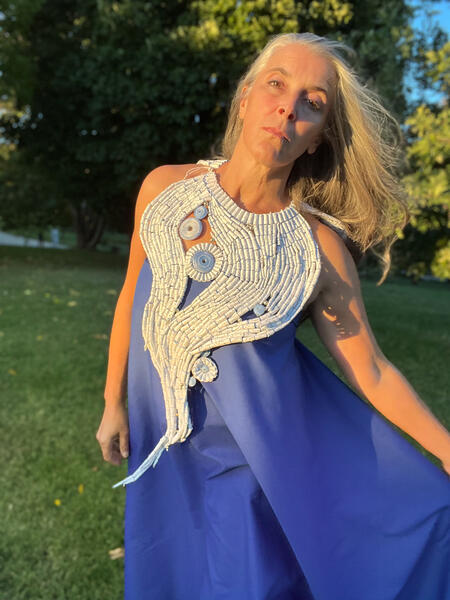Work samples
About Bridget
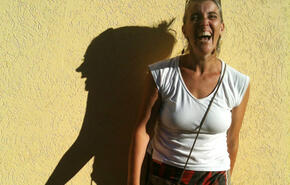
Bridget Parlato is a designer/artist/activist based in urban southeast Baltimore, MD. She runs Full Circuit Studio as a freelance designer specializing in cause-related work. She also heads up Baltimore Trash Talk, an anti-trash activism initiative that works towards raising awareness and seeking behavioral change through digital and print campaigns, sculptures, public events, performances, installations and school outreach.
Apart from her graphic portfolio, Parlato’s personal work… more
Plastic Land Book
Plastic Land evolved from a poem written for an environmental performance with Laure Drogoul. The initial performance of the poem was so well received that I continued to perform it publicly, receiving requests for copies and encouragement to create a book from it.
The book addresses the problems inherent to plastic creation, use and disposal, bringing into question our excessive use of the material and our consumption habits. It is meant to inform and contains a section of lessons that follow the book's content. The lessons can be used by parents or teachers to help young people better understand the concepts that the book brings to light.
As of 1/2024, the first complete draft is in the editing process and will be for sale through Amazon on or before Earth Day, 2024.
-
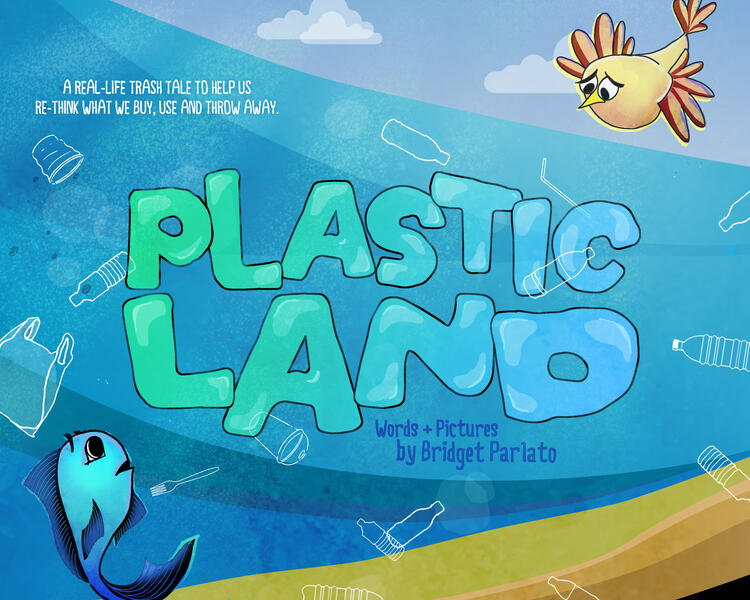 Plastic Land Book Cover
Plastic Land Book CoverBook cover for children's book about plastic, the problems inherent to its creation, use and disposal as well as solutions to those problems.
-
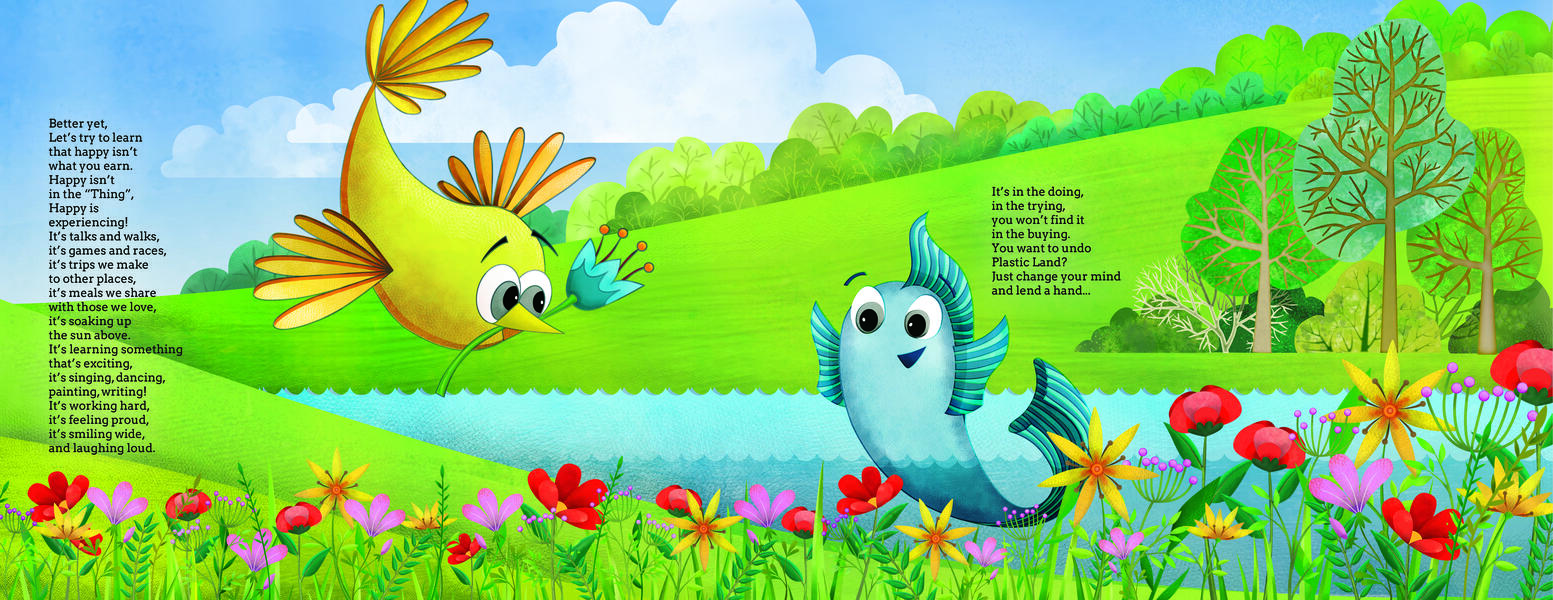 Plastic Land book spread - Better Yet...
Plastic Land book spread - Better Yet...Plastic Land book spread - Better Yet... - This two-page, illustration shows the book characters enjoying the natural world. The text discusses that happiness isn't found through material possessions but rather through experiences and shared time with each other.
-
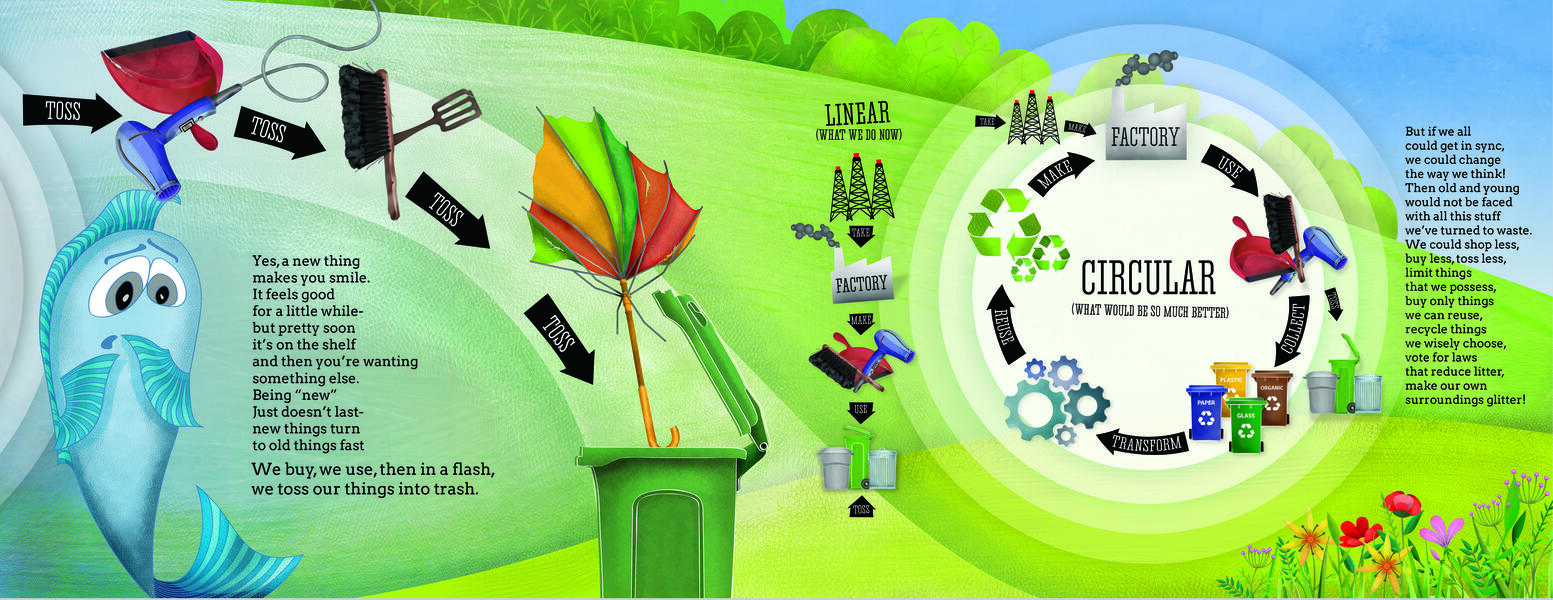 Plastic Land - Circular Economy/Old Things Fast spread
Plastic Land - Circular Economy/Old Things Fast spreadPlastic Land - Circular Economy/Old Things Fast spread
-
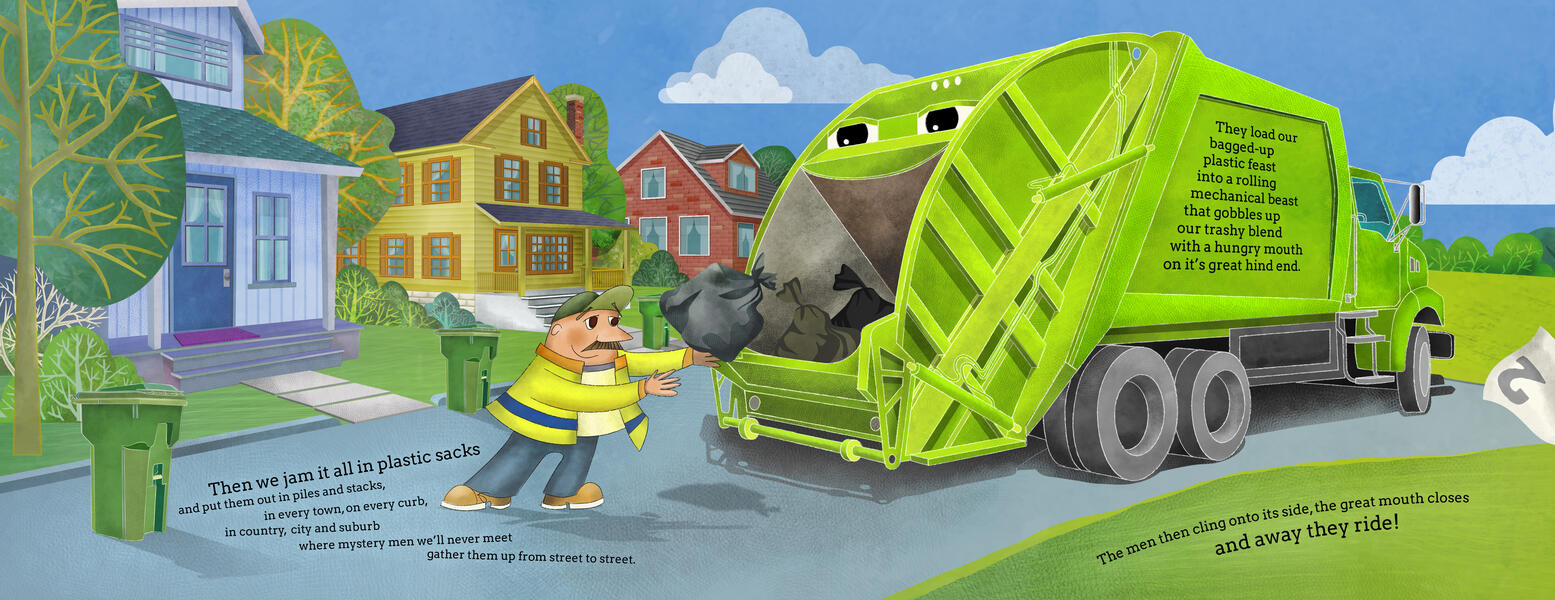 Plastic Land - Garbage Man spread
Plastic Land - Garbage Man spreadPlastic Land - Garbage Man spread
-
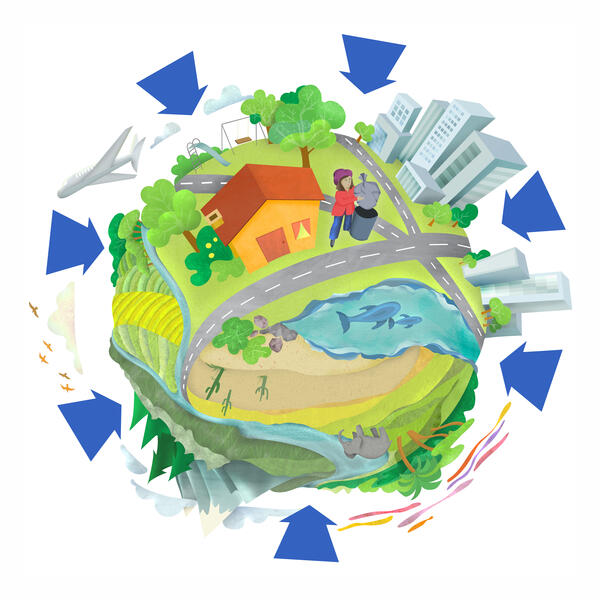 Away World Graphic
Away World GraphicAway World Graphic
Once Upon Water - Residency, Toronto
In May of 2023, I had the honor of being one of 14 international recipients of a 2 week residency entitled "Once Upon Water" at the Gibraltar Point Center for the Arts on Toronto Island in Canada. All artists were required to bring the theme of water into their creations.
I was accepted as a writer and explored water through poetry, photography, self-portraits and jewelry.
-
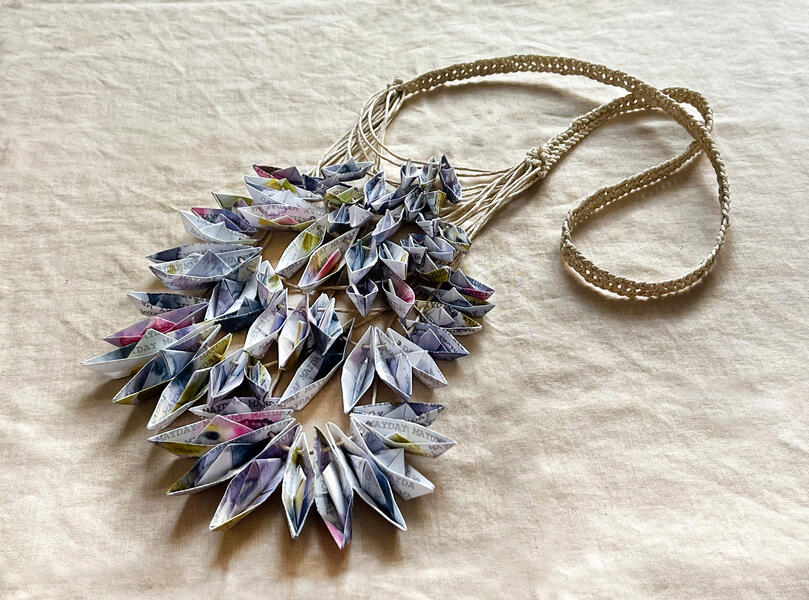 Once Upon Water - Mayday Necklace
Once Upon Water - Mayday NecklaceOnce Upon Water - Mayday Necklace
-
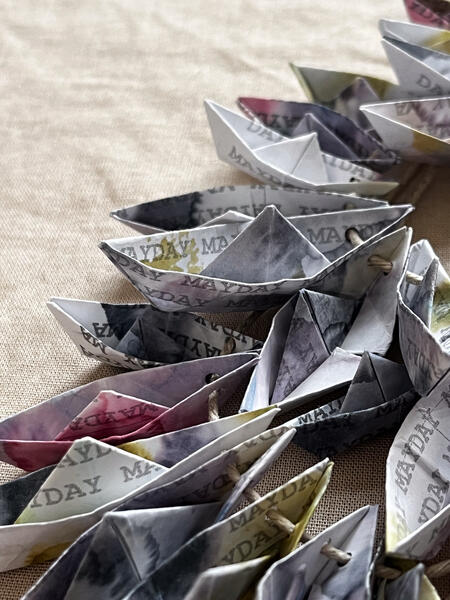 Mayday /The Precariousness of Our Predicament- a neckpiece of weathered paper boats imprinted with the repeated message, "Mayday".
Mayday /The Precariousness of Our Predicament- a neckpiece of weathered paper boats imprinted with the repeated message, "Mayday".Mayday /The Precariousness of Our Predicament- a neckpiece of weathered paper boats imprinted with the repeated message, "Mayday".
-
 Mayday / Waterspirit #1
Mayday / Waterspirit #1Mayday / Waterspirit #1
-
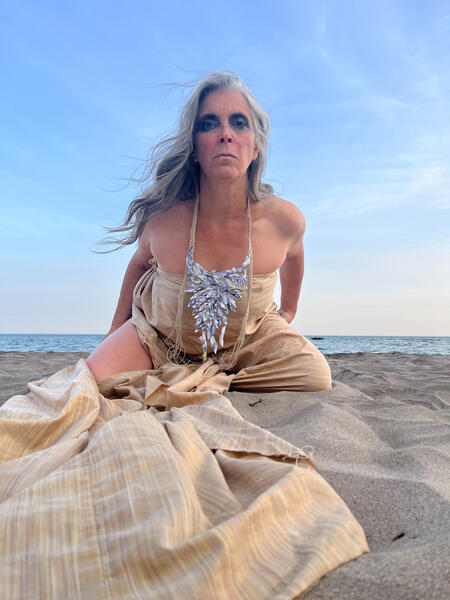 Mayday / Waterspirit #1
Mayday / Waterspirit #1Mayday / Waterspirit #1
Paper Bead / Women Warrior Breastplates
These two pieces are are the beginning of a series of "Women Warrior Breastplates" created to honor women trailblazers who have greatly contributed to social and environmental change. Both involve a large number of paper beads imprinted with text from their writings. Each required elaborate planning and meticulous craftsmanship.
In Honor of Her Honor is a "Lace Collar/Women Warrior Breastplate" designed to echo the iconic collars worn by Supreme Justice, Ruth Bader Ginsburg. The piece is comprised of 1000 paper beads imprinted with excerpts from her dissenting opinions.
“Earle Necklace” is created in honor of Dr. Sylvia Earle, a world reknown marine biologist, oceanographer, explorer, author, and lecturer. The piece is comprised of over 1800 paper beads cut imprinted with text from Dr. Earle's book, “The World is Blue: How Our Fate and the Ocean’s are One.”
-
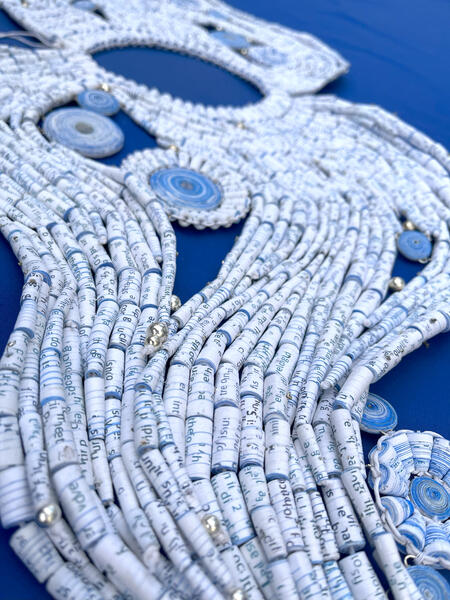 Earle Necklace - Women Warrior Breastplate in Honor of Oceanographer, Sylvia Earle
Earle Necklace - Women Warrior Breastplate in Honor of Oceanographer, Sylvia Earle"Earle Necklace" is a neckpiece formed from 1800 paper beads imprinted with text from Oceanographer Sylvia Earle's book "The World is Blue: How Our Fate and the Ocean's are One". The beads are strung on hemp cord and connected to form a set of waves that extend in a cascade down the front and back of the model.
-
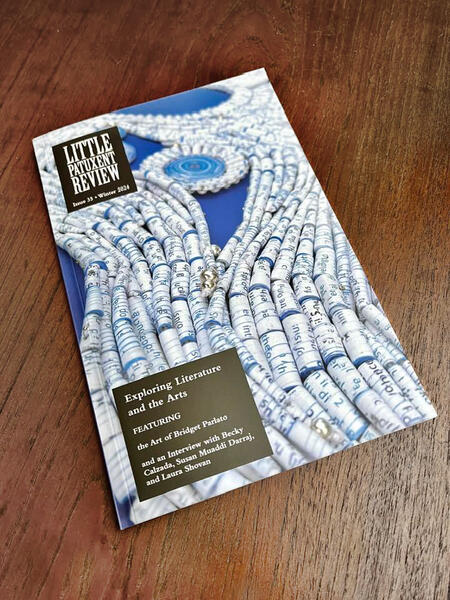 Earle Necklace - Little Patuxant Review
Earle Necklace - Little Patuxant ReviewEarle Necklace - Little Patuxant Review
-
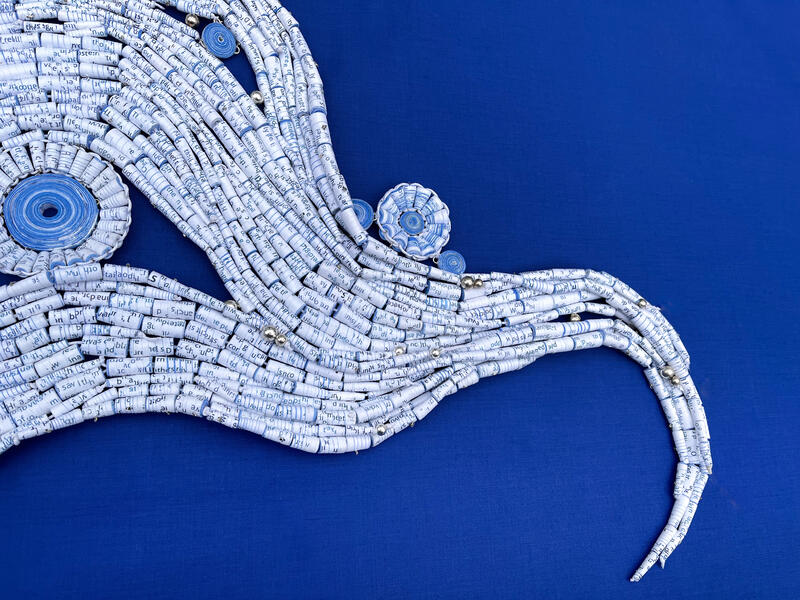 Earle Necklace - Women Warrior Breastplate in Honor of Oceanographer, Sylvia Earle
Earle Necklace - Women Warrior Breastplate in Honor of Oceanographer, Sylvia Earle"Earle Necklace" is a neckpiece formed from 1800 paper beads imprinted with text from Oceanographer Sylvia Earle's book "The World is Blue: How Our Fate and the Ocean's are One". The beads are strung on hemp cord and connected to form a set of waves that extend in a cascade down the front and back of the model.
-
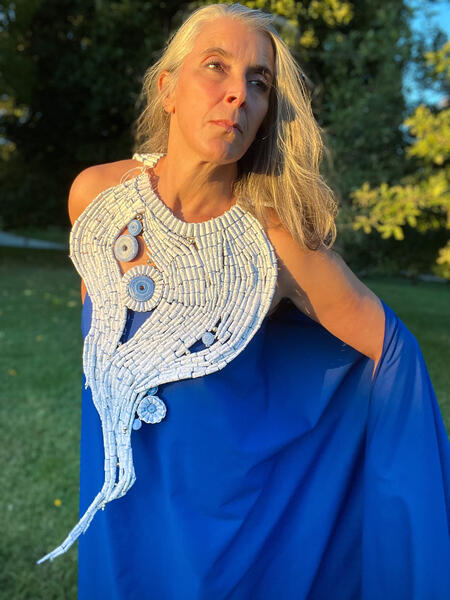 Earle Necklace - Women Warrior Breastplate in Honor of Oceanographer, Sylvia Earle
Earle Necklace - Women Warrior Breastplate in Honor of Oceanographer, Sylvia Earle"Earle Necklace" is a neckpiece formed from 1800 paper beads imprinted with text from Oceanographer Sylvia Earle's book "The World is Blue: How Our Fate and the Ocean's are One". The beads are strung on hemp cord and connected to form a set of waves that extend in a cascade down the front and back of the model.
-
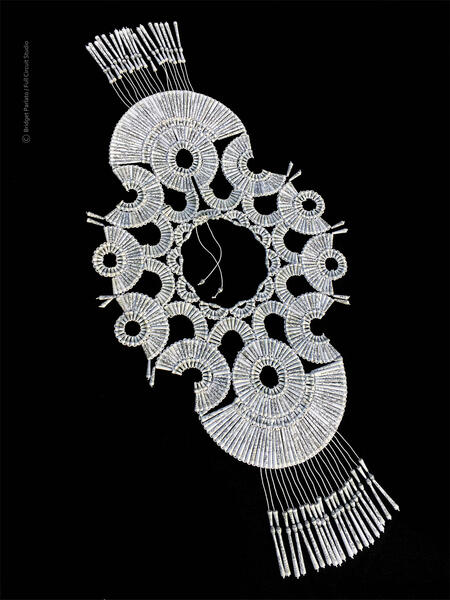 "In Honor of Her Honor", RBG Lace Collar / Warrior Breastplate"In Honor of Her Honor", RBG Lace Collar / Warrior Breastplate, 1000 paper beads created from the dissenting opinions of Ruth Bader Ginsberg. With 400+ submissions and 88 pieces on exhibit, This piece won one of 6 Juror's awards from Juror Carol Sauvion, creater and producer of CBS's, Craft in America.
"In Honor of Her Honor", RBG Lace Collar / Warrior Breastplate"In Honor of Her Honor", RBG Lace Collar / Warrior Breastplate, 1000 paper beads created from the dissenting opinions of Ruth Bader Ginsberg. With 400+ submissions and 88 pieces on exhibit, This piece won one of 6 Juror's awards from Juror Carol Sauvion, creater and producer of CBS's, Craft in America. -
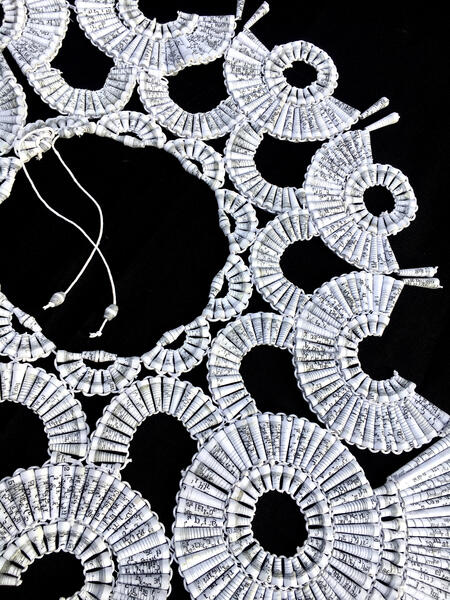 "In Honor of Her Honor", RBG Lace Collar / Warrior Breastplate (Detail)"In Honor of Her Honor", RBG Lace Collar / Warrior Breastplate, 1000 paper beads created from the dissenting opinions of Ruth Bader Ginsberg. Detail. With 400+ submissions and 88 pieces on exhibit, This piece won one of 6 Juror's awards from Juror Carol Sauvion, creater and producer of CBS's, Craft in America.
"In Honor of Her Honor", RBG Lace Collar / Warrior Breastplate (Detail)"In Honor of Her Honor", RBG Lace Collar / Warrior Breastplate, 1000 paper beads created from the dissenting opinions of Ruth Bader Ginsberg. Detail. With 400+ submissions and 88 pieces on exhibit, This piece won one of 6 Juror's awards from Juror Carol Sauvion, creater and producer of CBS's, Craft in America. -
In Honor of Her Honor", RBG Lace Collar / Warrior Breastplate"In Honor of Her Honor", RBG Lace Collar / Warrior Breastplate, 1000 paper beads created from the dissenting opinions of Ruth Bader Ginsberg. With 400+ submissions and 88 pieces on exhibit, This piece won one of 6 Juror's awards from Juror Carol Sauvion, creater and producer of CBS's, Craft in America.
-
In Honor of Her Honor", RBG Lace Collar / Warrior Breastplate"In Honor of Her Honor", RBG Lace Collar / Warrior Breastplate, 1000 paper beads created from the dissenting opinions of Ruth Bader Ginsberg. With 400+ submissions and 88 pieces on exhibit, This piece won one of 6 Juror's awards from Juror Carol Sauvion, creater and producer of CBS's, Craft in America.
Jewelry - Upcycled work
Most of my work involves upcycled elements. I often use tins and old costume jewelry. These pieces utilize cold-connection methods for assembly.
The production line pieces use fused plastic bags for their colorful portions with copper, brass and nickel for the metal portions and silver ear wires.
-
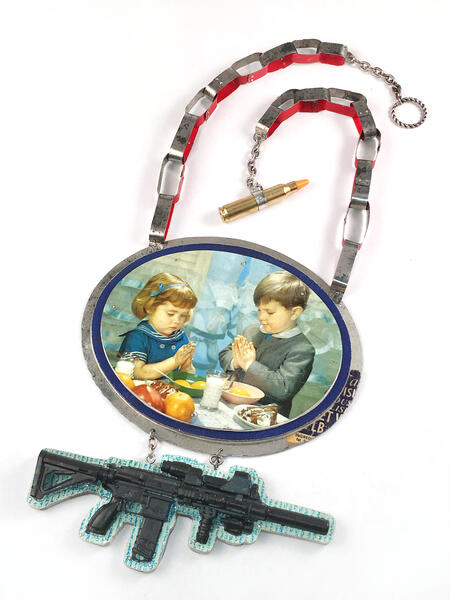 Thoughts and Prayers
Thoughts and PrayersThoughts and Prayers - Upcycled Piece Addressing Mass Shootings and Gun Violence
-
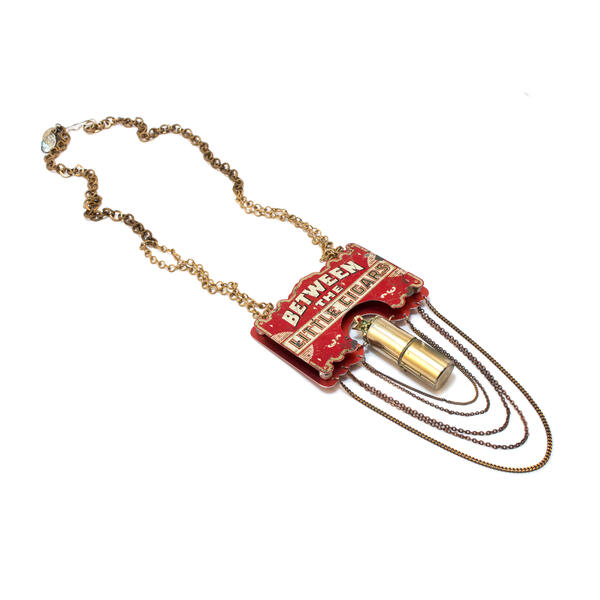 Between the Little Cigars necklace / Juror's Choice AwardMany of my piece incorporate vintage tins and old costume jewelry. These pieces utilize cold-connection methods for assembly. This piece was part of a group of pieces that won Juror's Choice award, created for Baltimore Jewelry Center's exhibition of Radical Jewelry Makeover (RJM). RJM was a major undertaking, gathering used jewelry from the community, disbursing it to artists for reinterpretation/upcycling into new jewelry.
Between the Little Cigars necklace / Juror's Choice AwardMany of my piece incorporate vintage tins and old costume jewelry. These pieces utilize cold-connection methods for assembly. This piece was part of a group of pieces that won Juror's Choice award, created for Baltimore Jewelry Center's exhibition of Radical Jewelry Makeover (RJM). RJM was a major undertaking, gathering used jewelry from the community, disbursing it to artists for reinterpretation/upcycling into new jewelry. -
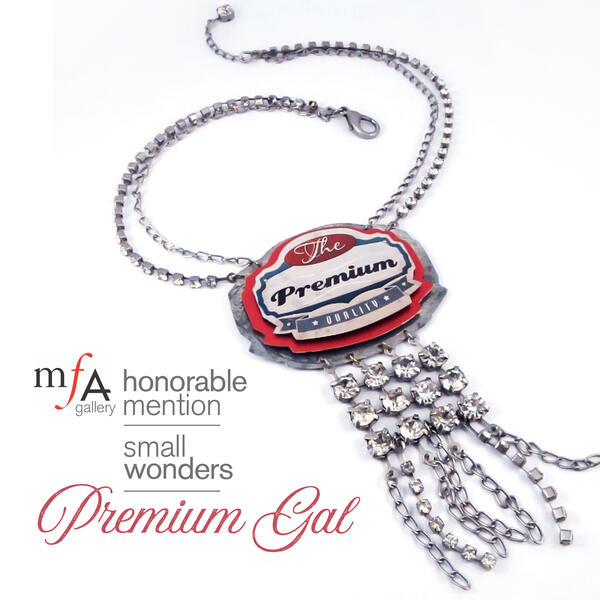 Premium Gal / Honorable Mention, Small Wonders ShowMany of my piece incorporate vintage tins and old costume jewelry. These pieces utilize cold-connection methods for assembly.
Premium Gal / Honorable Mention, Small Wonders ShowMany of my piece incorporate vintage tins and old costume jewelry. These pieces utilize cold-connection methods for assembly. -
Supreme Gal NecklaceMany of my piece incorporate vintage tins and old costume jewelry. These pieces utilize cold-connection methods for assembly. This piece incorporates a Cutlass Supreme car emblem.
-
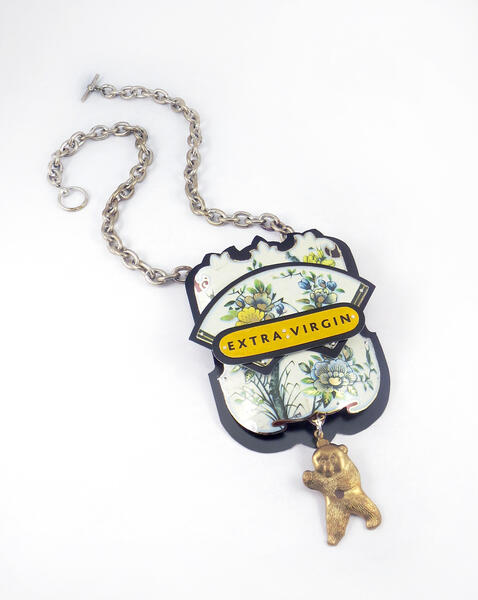 Extra Virgin NecklaceMany of my piece incorporate vintage tins and old costume jewelry. These pieces utilize cold-connection methods for assembly. This piece incorporates a vintage floral tin and parts of an Extra Virgin Olive Oil container.
Extra Virgin NecklaceMany of my piece incorporate vintage tins and old costume jewelry. These pieces utilize cold-connection methods for assembly. This piece incorporates a vintage floral tin and parts of an Extra Virgin Olive Oil container. -
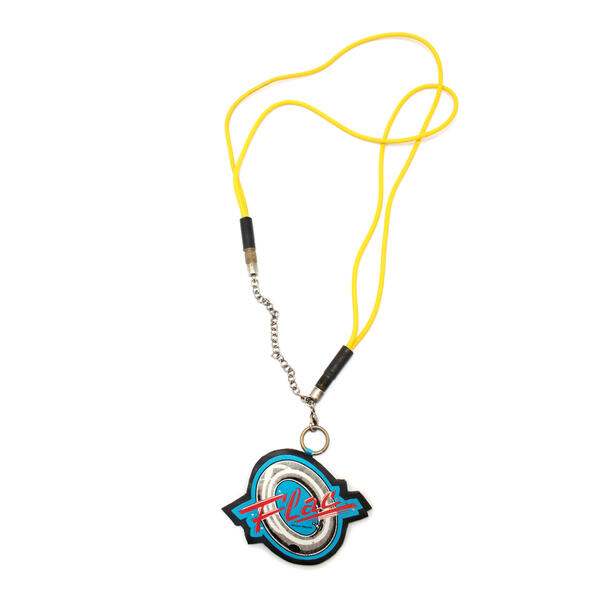 No Flac Necklace / Juror's Choice AwardMany of my piece incorporate vintage tins and old costume jewelry. These pieces utilize cold-connection methods for assembly. This piece was part of a group of pieces that won Juror's Choice award, created for Baltimore Jewelry Center's exhibition of Radical Jewelry Makeover (RJM). RJM was a major undertaking, gathering used jewelry from the community, disbursing it to artists for reinterpretation/upcycling into new jewelry.
No Flac Necklace / Juror's Choice AwardMany of my piece incorporate vintage tins and old costume jewelry. These pieces utilize cold-connection methods for assembly. This piece was part of a group of pieces that won Juror's Choice award, created for Baltimore Jewelry Center's exhibition of Radical Jewelry Makeover (RJM). RJM was a major undertaking, gathering used jewelry from the community, disbursing it to artists for reinterpretation/upcycling into new jewelry. -
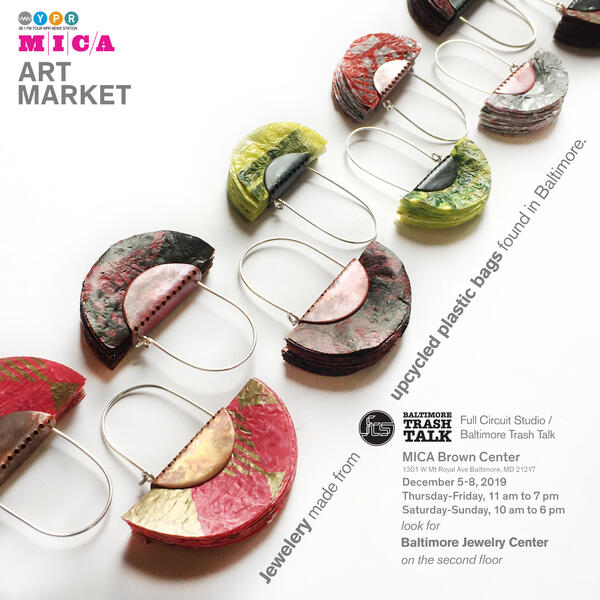 Production Line - Part of Mica's Winter Art MarketProduction line pieces use fused plastic bags for their colorful portions with copper, brass and nickel for the metal portions, silver ear wires or purchased pendant cords.
Production Line - Part of Mica's Winter Art MarketProduction line pieces use fused plastic bags for their colorful portions with copper, brass and nickel for the metal portions, silver ear wires or purchased pendant cords. -
Production Line - Mixed Styles of Earrings and RingsProduction line pieces use fused plastic bags for their colorful portions with copper, brass and nickel for the metal portions, silver ear wires or purchased pendant cords.
-
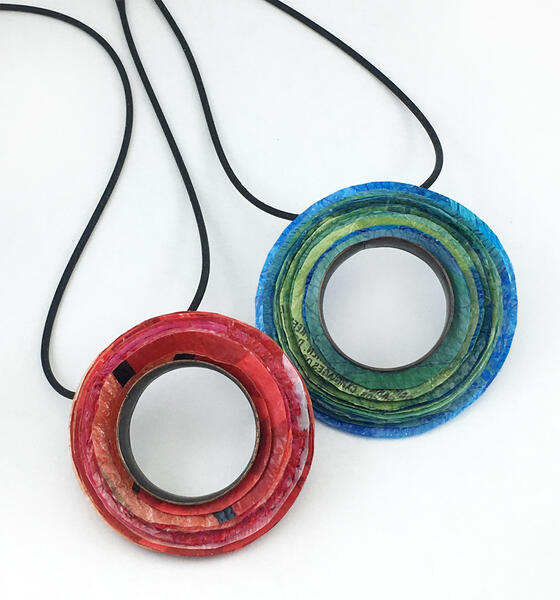 Production Line - Layered PendantsProduction line pieces use fused plastic bags for their colorful portions with copper, brass and nickel for the metal portions, silver ear wires or purchased pendant cords.
Production Line - Layered PendantsProduction line pieces use fused plastic bags for their colorful portions with copper, brass and nickel for the metal portions, silver ear wires or purchased pendant cords.
Reliquaries
These pieces were made from items taken from my parent's home in 2017 after their deaths, 10 months apart. These pieces are created from items taken from my father's desk and fabrics that my were associated with my mother's life.
The two assemblage pieces are reliquaries that contain clippings from the last haircut I have to my father. The items used represented his life as a wood-working teacher and a farrier. The items were precious and therefore, prompted me to take jewelry and metalsmithing classes at Baltimore Jewelry Center so that I could better execute well crafted pieces without destroying treasured items.
The patchwork piece is a small, cinchable quilt that turns into a cloth bag. The white interior is a portion of fabric that was used as a shroud for my mother's body. Two of my sisters and myself used the shroud to wrap her body after we washed and dressed her in preparation for cremation.
The exterior fabrics are from tea towels, pot holders, our Christmas tree skirt which she block printed, and the nightgown she passed in, and snippets from items of clothing she made for herself and for her children when we were young.
Environmental Arts - Community Exhibitions, Installations and public works
For over a decade, Ms. Parlato has planned, marketed and executed exhibitions and public events to raise environmental awareness.
-
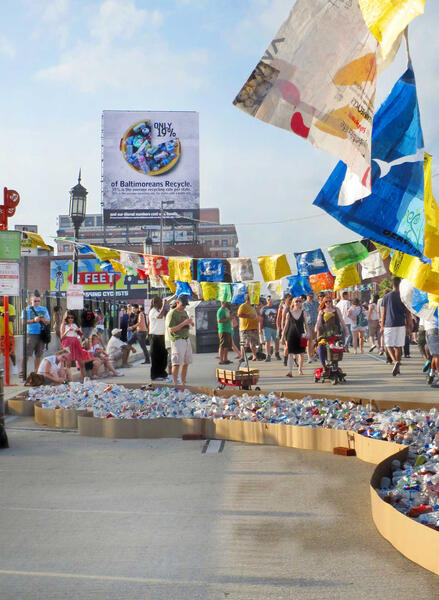 Artscape River of Trash
Artscape River of TrashArtscape River of Trash
-
Baltimore Trash Talk Artscape - River of Recyclables / Prayers for the Sea - Installation 1This River of Recyclables was established at Artscape 2015 - which focused on a water theme. It was part of a show called Harbor High Port (of call) and other Phenomenades curated by Laure Drogoul. This piece was comprised of bottles and cans collected from 10 recycling bins placed by Baltimore Trash Talk as well as from trash cans at the event. 100 flags influenced by Tibetan Prayer Flags were created to fly above the river. The flags were comprised of fused plastic bags and had images of sea creatures cut into them or fused onto them. Plastic bags are one of the most littered items found on both land and in the oceans. The piece was accompanied by Baltimore Trash Talk posters shown on the Charles Street LED billboard in the near distance.
-
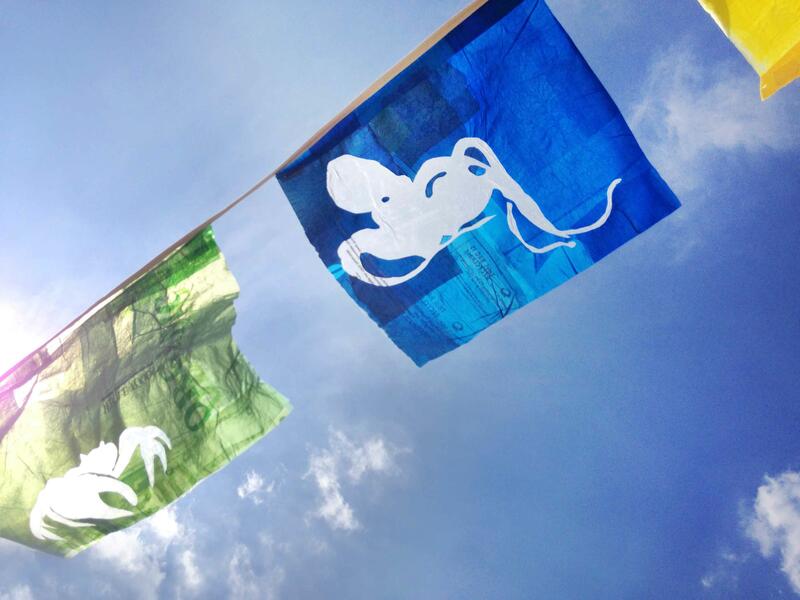 Prayers for the Sea- 100 "prayer" flags made from fused plastic bags cut through with shapes of sea creatures.
Prayers for the Sea- 100 "prayer" flags made from fused plastic bags cut through with shapes of sea creatures.Prayers for the Sea- 100 "prayer" flags made from fused plastic bags cut through with shapes of sea creatures.
-
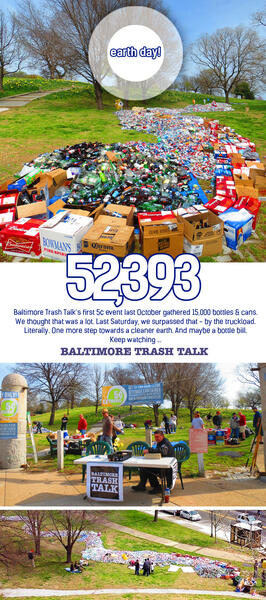 River of Recyclables - Email about 5 cent Bottle Return eventEmail showing pictures and results of the second 5¢ bottle and can return event. This event was 6 months after the first event and the total number of items returned more than tripled from 15K to 52K+. The first two river events were funded by BGE through a grant. I applied for the grant, planned the event, designed marketing materials for it and marketed it. I ran the event, enlisting the volunteer help of friends and family. The events were based on the container deposit laws in place in 10 States in the US. Those laws (aka. Bottle Bills) attach 5-10¢ to a beverage container at purchase. That fee is refunded when the container is returned to a store or return center. Bottle Bills increase recyling, reduce the need for virgin materials/energy used to create new ones and drastically reduce litter.
River of Recyclables - Email about 5 cent Bottle Return eventEmail showing pictures and results of the second 5¢ bottle and can return event. This event was 6 months after the first event and the total number of items returned more than tripled from 15K to 52K+. The first two river events were funded by BGE through a grant. I applied for the grant, planned the event, designed marketing materials for it and marketed it. I ran the event, enlisting the volunteer help of friends and family. The events were based on the container deposit laws in place in 10 States in the US. Those laws (aka. Bottle Bills) attach 5-10¢ to a beverage container at purchase. That fee is refunded when the container is returned to a store or return center. Bottle Bills increase recyling, reduce the need for virgin materials/energy used to create new ones and drastically reduce litter. -
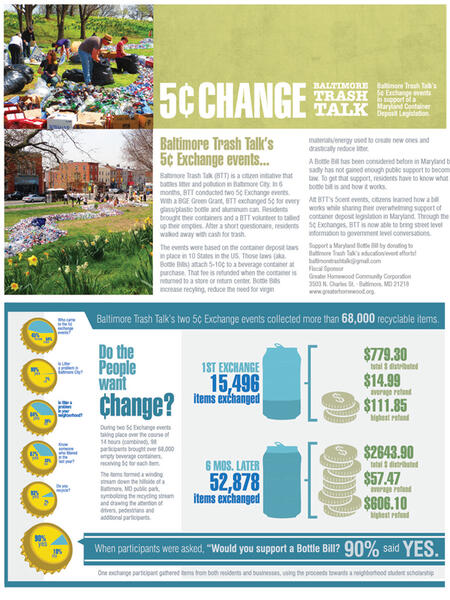 5 cent Bottle & Can Exchange flyer for use in testifying in support of a Bottle Exchange Bill
5 cent Bottle & Can Exchange flyer for use in testifying in support of a Bottle Exchange Bill5 cent Bottle & Can Exchange flyer for use in testifying in support of a Bottle Exchange Bill
-
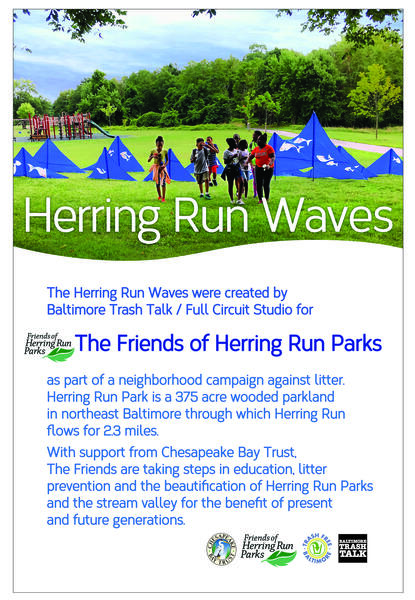 Herring Run Poster (displayed wherever waves are displayed)
Herring Run Poster (displayed wherever waves are displayed) -
Unnatural Causes / Art for the Environment Exhibition - part of Urban Wilderness Weekend.Unnatural Causes / Art for the Environment Exhibition - part of Urban Wilderness Weekend. This exhibition was unfunded and held as a free community event. All of my work was pro-bono, including planning, installation and marketing of this event. The event was held at Baltimore Mead Works.
-
Unnatural Causes / Art for the Environment Exhibition - part of Urban Wilderness Weekend.Unnatural Causes / Art for the Environment Exhibition - part of Urban Wilderness Weekend. This exhibition was unfunded and held as a free community event. All of my work was pro-bono, including planning, installation and marketing of this event. The event was held at Baltimore Mead Works.
-
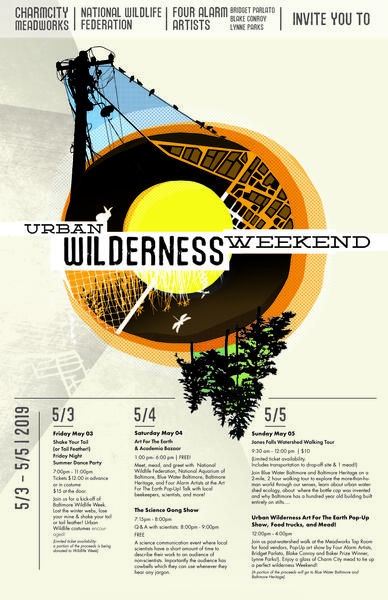 Urban Wilderness Weekend PosterUnnatural Causes / Art for the Environment Exhibition - part of Urban Wilderness Weekend. This exhibition was unfunded and held as a free community event. All of my work was pro-bono, including planning, installation and marketing of this event. The event was held at Baltimore Mead Works.
Urban Wilderness Weekend PosterUnnatural Causes / Art for the Environment Exhibition - part of Urban Wilderness Weekend. This exhibition was unfunded and held as a free community event. All of my work was pro-bono, including planning, installation and marketing of this event. The event was held at Baltimore Mead Works. -
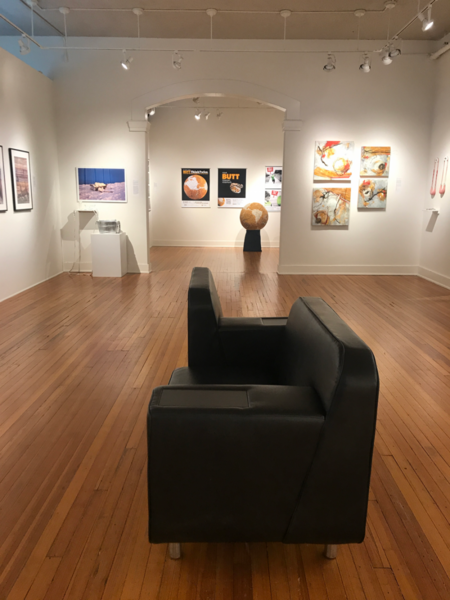 Unnatural Causes Exhibition / Maryland Hall GalleryUnnatural Causes Exhibition / Maryland Hall Gallery - One of three exhibitions featuring environmental art (Meadworks, Creative Alliance, Maryland Hall). None of these shows were funded and all were free to the community in hopes of raising environmental and biodiversity awareness.
Unnatural Causes Exhibition / Maryland Hall GalleryUnnatural Causes Exhibition / Maryland Hall Gallery - One of three exhibitions featuring environmental art (Meadworks, Creative Alliance, Maryland Hall). None of these shows were funded and all were free to the community in hopes of raising environmental and biodiversity awareness.
Cigarette Planet Campaign
This campaign is part of an effort to fight cigarette litter in downtown Baltimore. The posters feature The Cigarette Planet - a 30" mache globe covered with cigarette butts picked up off the streets of Baltimore.
In partnership with the Environmental Control Board of Baltimore and Waterfront Partnership, a Keep America Beautiful grant was obtained to fund the effort. The images are also used on Terracycle cigarette butt recycling containers in the southeast area of the inner harbor.
-
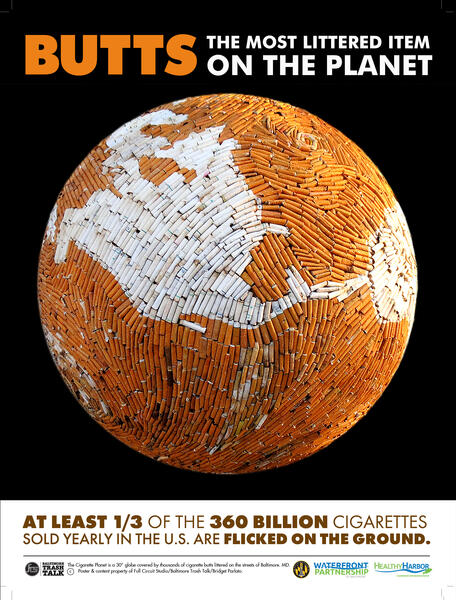 Cigarette Butt Campaign and Cigarette Planet
Cigarette Butt Campaign and Cigarette PlanetThe Cigarette Butt Poster Campaign is a reusable set of graphics (of course it is!) that can be adapted for future client use to raise awareness about cigarette butt litter.
The 30" planet was made from paper mache and covered with over 1200 cigarette butts picked up off of the streets of Baltimore. I developed a set of informational posters to accompany the planet, approaching members of Baltimore government as they applied for a "Keep America Beautiful" grant. The graphics were used to help obtain the grant and now are part of a cigarette butt recycling campaign in southeast Baltimore -
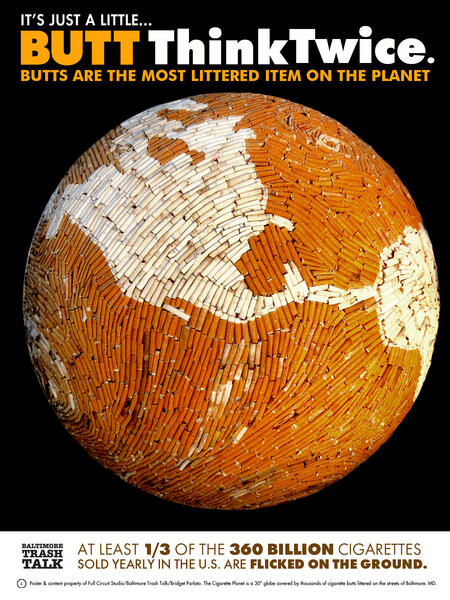 It's Just a Little Butt...The Most Littered Item on The PlanetPoster featuring the Cigarette Planet and reminding smokers that despite butts being small, they are THE most littered item on the planet.
It's Just a Little Butt...The Most Littered Item on The PlanetPoster featuring the Cigarette Planet and reminding smokers that despite butts being small, they are THE most littered item on the planet. -
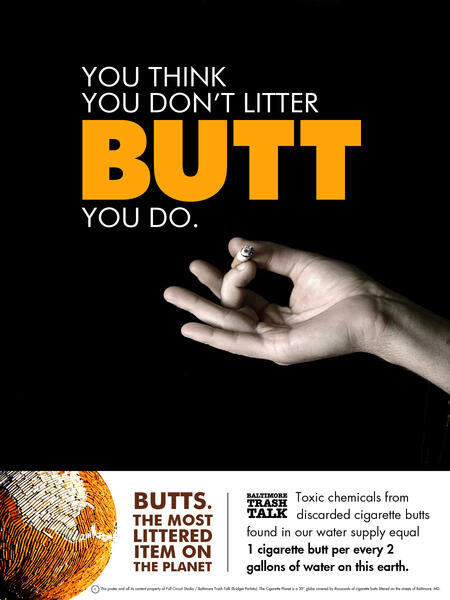 Flicking - You Think You Don't Litter...Poster taking on the practice of flicking cigarette butts.
Flicking - You Think You Don't Litter...Poster taking on the practice of flicking cigarette butts. -
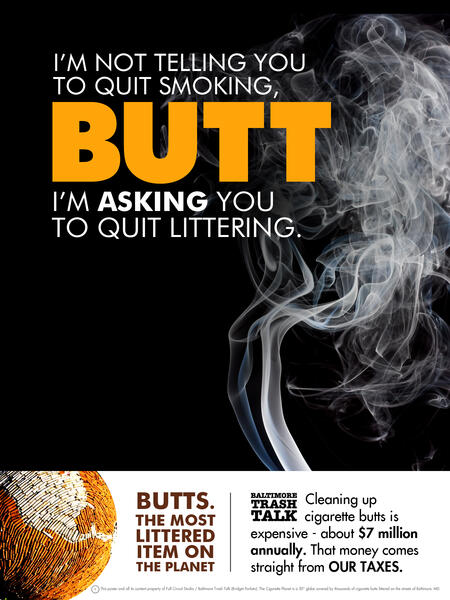 I'm Not Telling You To Quit Smoking...Poster focusing on the difference between asking someone to quit their personal habit and asking them to not dirty the environment with it.
I'm Not Telling You To Quit Smoking...Poster focusing on the difference between asking someone to quit their personal habit and asking them to not dirty the environment with it. -
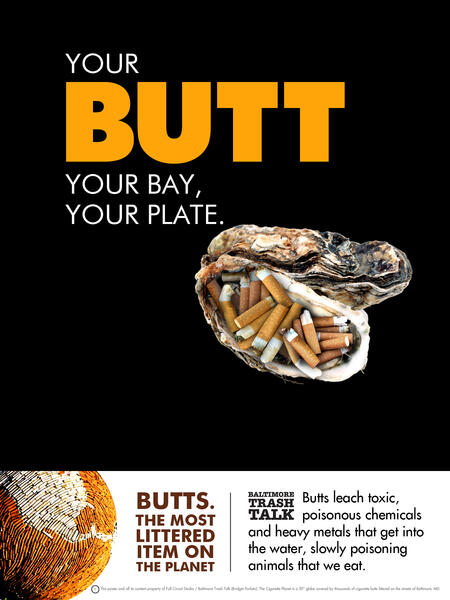 Your Butt, Your Bay, Your Plate...Poster making the association between what we litter and how it impacts what we eat (i.e. the health of our bodies) - especially in a city that is based on a bay and enjoys seafood FROM that bay.
Your Butt, Your Bay, Your Plate...Poster making the association between what we litter and how it impacts what we eat (i.e. the health of our bodies) - especially in a city that is based on a bay and enjoys seafood FROM that bay. -
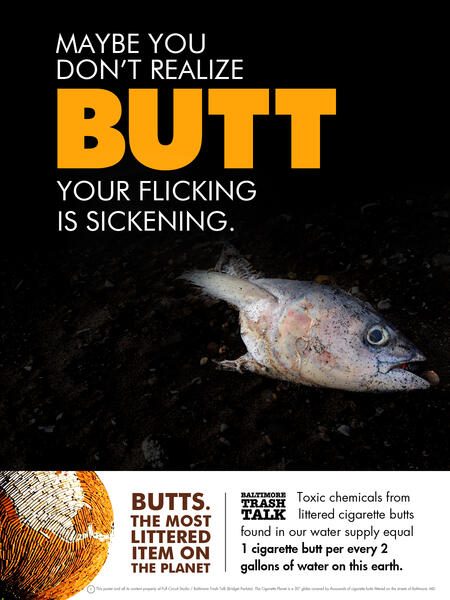 Your Flicking is Sickening...Poster blatantly reminding smokers that their butts are leaching poisons into our water system, poisoning us and other living creatures that depend upon that water.
Your Flicking is Sickening...Poster blatantly reminding smokers that their butts are leaching poisons into our water system, poisoning us and other living creatures that depend upon that water. -
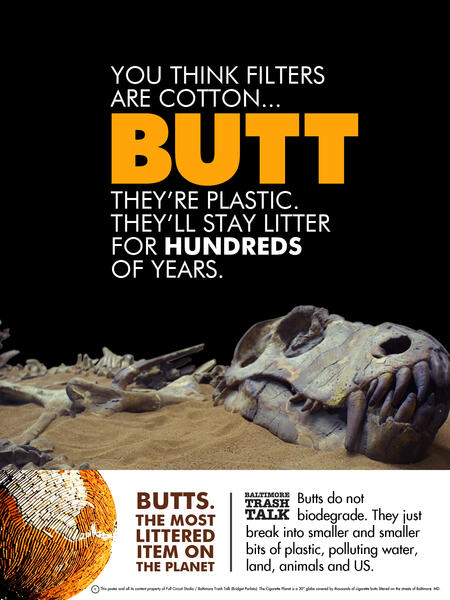 Butts Never Go AwayPoster blatantly reminding smokers that butts are plastic and do NOT biodegrade.
Butts Never Go AwayPoster blatantly reminding smokers that butts are plastic and do NOT biodegrade. -
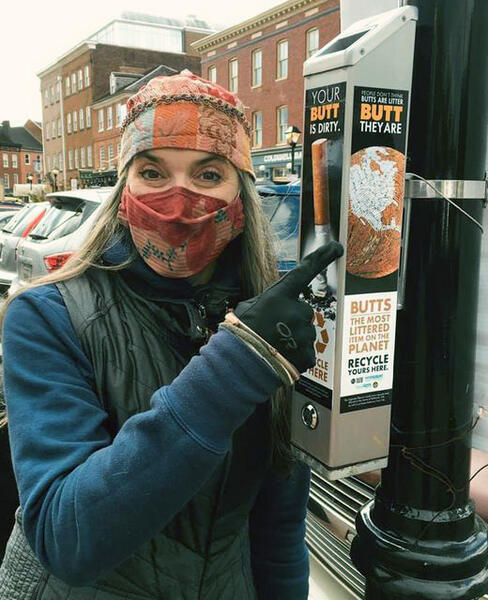 Cigarette Butt Stickers in place in Baltimore's Inner HarborStickers in place on Terracycle cigarette butt containers in Baltimore's Inner Harbor.
Cigarette Butt Stickers in place in Baltimore's Inner HarborStickers in place on Terracycle cigarette butt containers in Baltimore's Inner Harbor. -
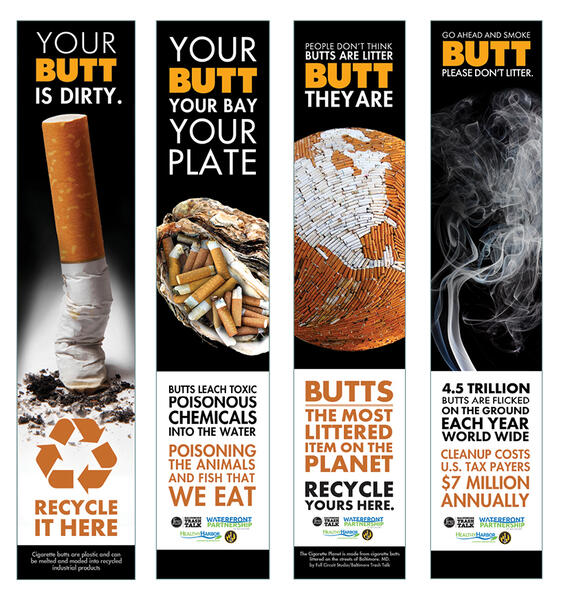 Terracycle Urn sticker graphics.Terracycle Urn sticker graphics.
Terracycle Urn sticker graphics.Terracycle Urn sticker graphics.
Bag Ban Campaign
Graphics designed for the Baltimore Office of Sustainability to promote the bag ban in Baltimore city. These graphics utilize bright colors, simple layouts and tongue-in-cheek humor from the point of view of the plastic bag, reminding Baltimoreans that bringing and using reusable bags helps reduce litter, save animals and avoid a bag fee.
Over 30 finished graphics were supplied to the Baltimore Office of Sustainability for promotional use.
-
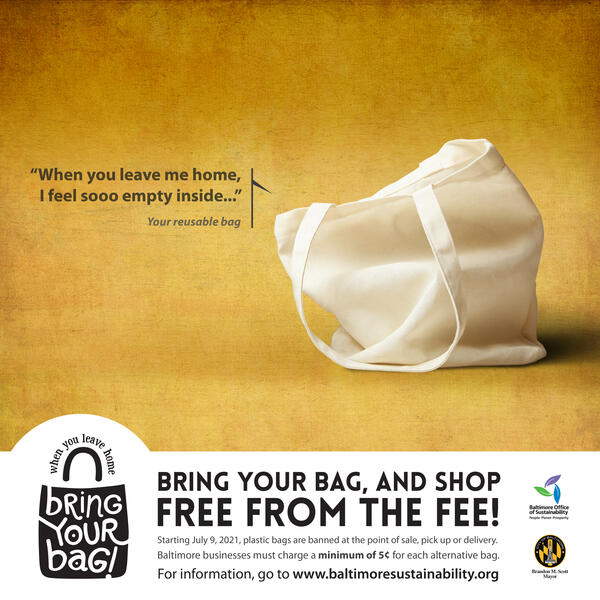 Bag Ban Campaign - So EmptyGraphics designed for the Baltimore Office of Sustainability to promote the bag ban in Baltimore city. Graphics utilize bright colors, simple layouts and tongue-in-cheek humor from the point of view of the plastic bag, reminding Baltimoreans that bringing and using reusable bags helps reduce litter, save animals and avoid a bag fee.
Bag Ban Campaign - So EmptyGraphics designed for the Baltimore Office of Sustainability to promote the bag ban in Baltimore city. Graphics utilize bright colors, simple layouts and tongue-in-cheek humor from the point of view of the plastic bag, reminding Baltimoreans that bringing and using reusable bags helps reduce litter, save animals and avoid a bag fee. -
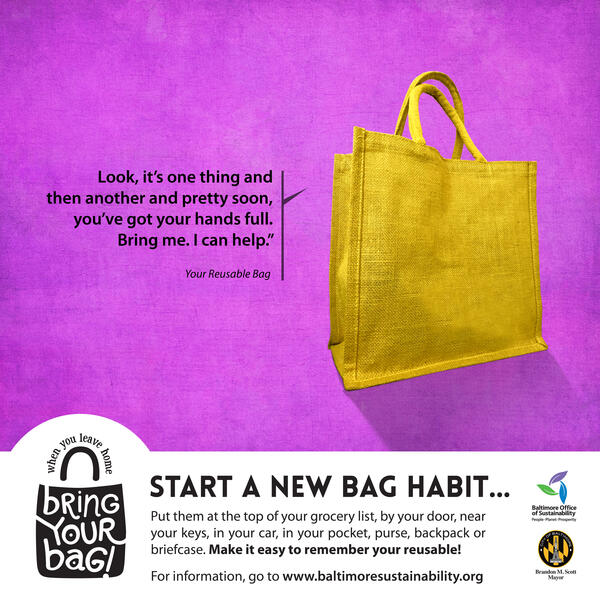 Bag Ban Campaign - One Thing and Then AnotherGraphics designed for the Baltimore Office of Sustainability to promote the bag ban in Baltimore city. Graphics utilize bright colors, simple layouts and tongue-in-cheek humor from the point of view of the plastic bag, reminding Baltimoreans that bringing and using reusable bags helps reduce litter, save animals and avoid a bag fee.
Bag Ban Campaign - One Thing and Then AnotherGraphics designed for the Baltimore Office of Sustainability to promote the bag ban in Baltimore city. Graphics utilize bright colors, simple layouts and tongue-in-cheek humor from the point of view of the plastic bag, reminding Baltimoreans that bringing and using reusable bags helps reduce litter, save animals and avoid a bag fee. -
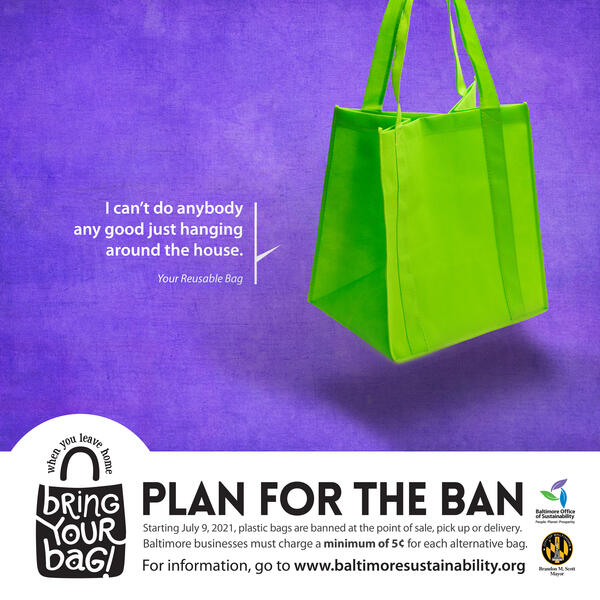 Bag Ban Campaign - Hanging AroundGraphics designed for the Baltimore Office of Sustainability to promote the bag ban in Baltimore city. Graphics utilize bright colors, simple layouts and tongue-in-cheek humor from the point of view of the plastic bag, reminding Baltimoreans that bringing and using reusable bags helps reduce litter, save animals and avoid a bag fee.
Bag Ban Campaign - Hanging AroundGraphics designed for the Baltimore Office of Sustainability to promote the bag ban in Baltimore city. Graphics utilize bright colors, simple layouts and tongue-in-cheek humor from the point of view of the plastic bag, reminding Baltimoreans that bringing and using reusable bags helps reduce litter, save animals and avoid a bag fee. -
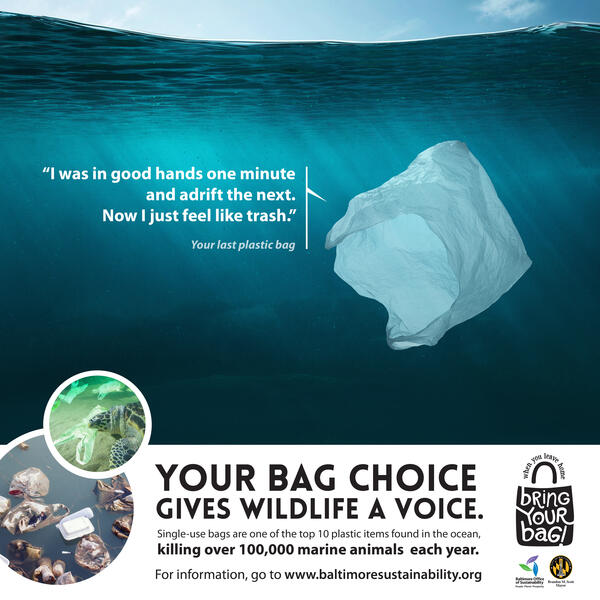 Bag Ban Campaign - Feel Like Ocean TrashGraphics designed for the Baltimore Office of Sustainability to promote the bag ban in Baltimore city. Graphics utilize bright colors, simple layouts and tongue-in-cheek humor from the point of view of the plastic bag, reminding Baltimoreans that bringing and using reusable bags helps reduce litter, save animals and avoid a bag fee.
Bag Ban Campaign - Feel Like Ocean TrashGraphics designed for the Baltimore Office of Sustainability to promote the bag ban in Baltimore city. Graphics utilize bright colors, simple layouts and tongue-in-cheek humor from the point of view of the plastic bag, reminding Baltimoreans that bringing and using reusable bags helps reduce litter, save animals and avoid a bag fee. -
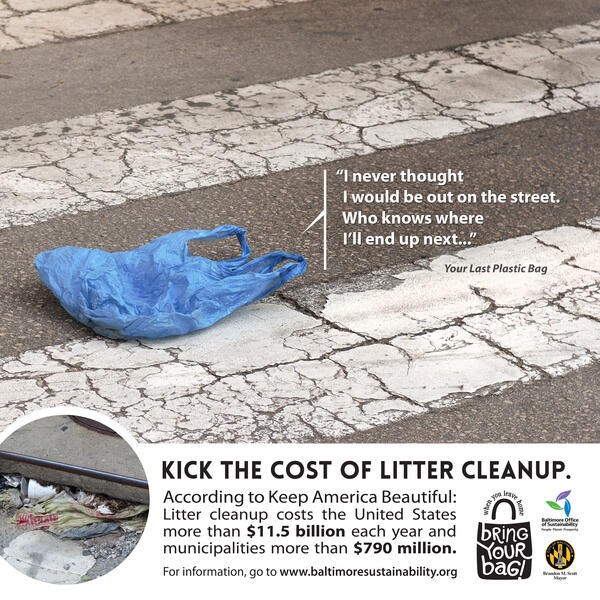 Bag Ban Campaign -On the StreetGraphics designed for the Baltimore Office of Sustainability to promote the bag ban in Baltimore city. Graphics utilize bright colors, simple layouts and tongue-in-cheek humor from the point of view of the plastic bag, reminding Baltimoreans that bringing and using reusable bags helps reduce litter, save animals and avoid a bag fee.
Bag Ban Campaign -On the StreetGraphics designed for the Baltimore Office of Sustainability to promote the bag ban in Baltimore city. Graphics utilize bright colors, simple layouts and tongue-in-cheek humor from the point of view of the plastic bag, reminding Baltimoreans that bringing and using reusable bags helps reduce litter, save animals and avoid a bag fee. -
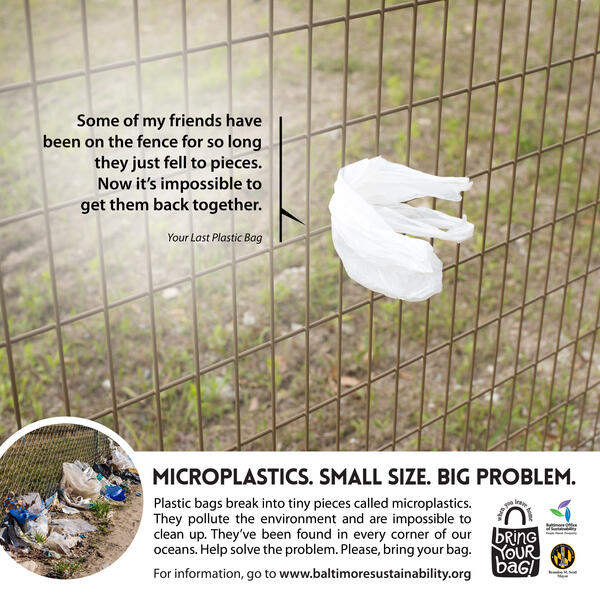 Bag Ban Campaign - MicroplasticsGraphics designed for the Baltimore Office of Sustainability to promote the bag ban in Baltimore city. Graphics utilize bright colors, simple layouts and tongue-in-cheek humor from the point of view of the plastic bag, reminding Baltimoreans that bringing and using reusable bags helps reduce litter, save animals and avoid a bag fee.
Bag Ban Campaign - MicroplasticsGraphics designed for the Baltimore Office of Sustainability to promote the bag ban in Baltimore city. Graphics utilize bright colors, simple layouts and tongue-in-cheek humor from the point of view of the plastic bag, reminding Baltimoreans that bringing and using reusable bags helps reduce litter, save animals and avoid a bag fee. -
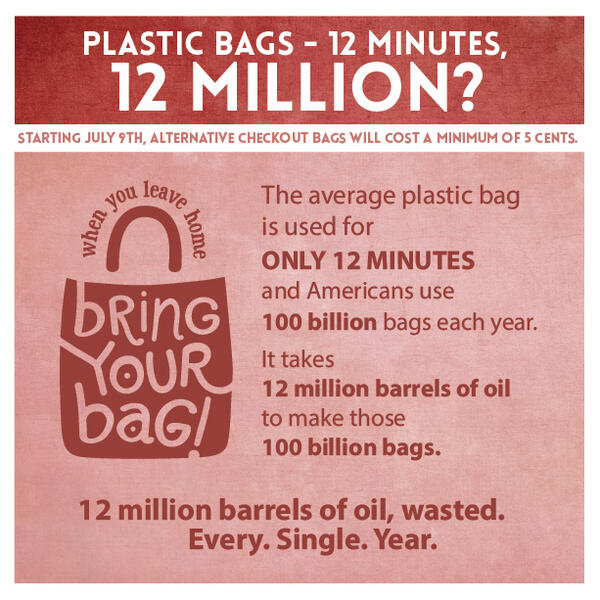 Bag Ban Social Media Factoid - 12 MillionGraphics designed for the Baltimore Office of Sustainability to promote the bag ban in Baltimore city. Graphics utilize bright colors, simple layouts and tongue-in-cheek humor from the point of view of the plastic bag, reminding Baltimoreans that bringing and using reusable bags helps reduce litter, save animals and avoid a bag fee.
Bag Ban Social Media Factoid - 12 MillionGraphics designed for the Baltimore Office of Sustainability to promote the bag ban in Baltimore city. Graphics utilize bright colors, simple layouts and tongue-in-cheek humor from the point of view of the plastic bag, reminding Baltimoreans that bringing and using reusable bags helps reduce litter, save animals and avoid a bag fee. -
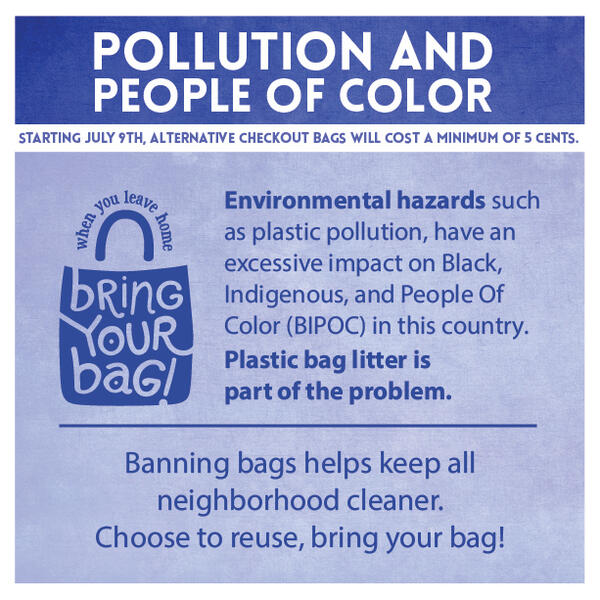 Bag Ban Social Media Factoid - Ppl of Color small.jpg
Bag Ban Social Media Factoid - Ppl of Color small.jpg -
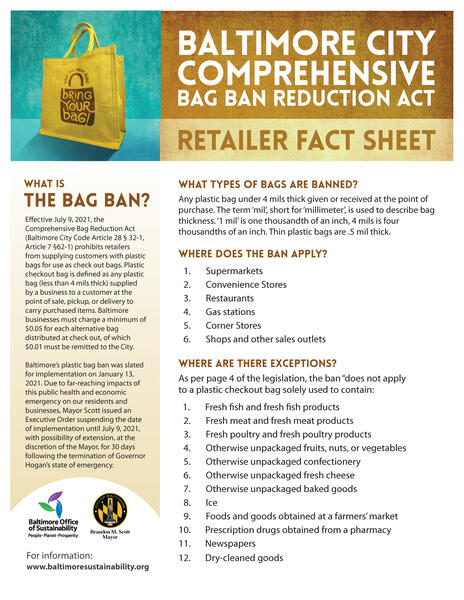 Bag Ban retail flyer (front only)Graphics designed for the Baltimore Office of Sustainability to promote the bag ban in Baltimore city. Graphics utilize bright colors, simple layouts and tongue-in-cheek humor from the point of view of the plastic bag, reminding Baltimoreans that bringing and using reusable bags helps reduce litter, save animals and avoid a bag fee.
Bag Ban retail flyer (front only)Graphics designed for the Baltimore Office of Sustainability to promote the bag ban in Baltimore city. Graphics utilize bright colors, simple layouts and tongue-in-cheek humor from the point of view of the plastic bag, reminding Baltimoreans that bringing and using reusable bags helps reduce litter, save animals and avoid a bag fee. -
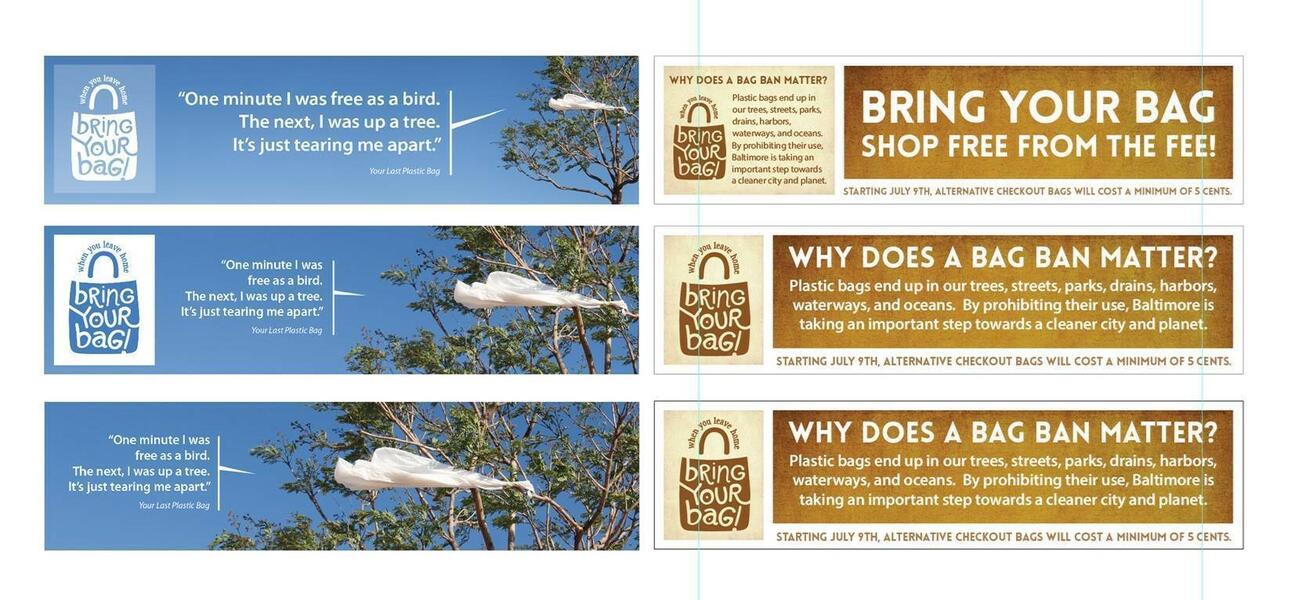 Bag Ban Campaign - Social Media HeadersGraphics designed for the Baltimore Office of Sustainability to promote the bag ban in Baltimore city. Graphics utilize bright colors, simple layouts and tongue-in-cheek humor from the point of view of the plastic bag, reminding Baltimoreans that bringing and using reusable bags helps reduce litter, save animals and avoid a bag fee.
Bag Ban Campaign - Social Media HeadersGraphics designed for the Baltimore Office of Sustainability to promote the bag ban in Baltimore city. Graphics utilize bright colors, simple layouts and tongue-in-cheek humor from the point of view of the plastic bag, reminding Baltimoreans that bringing and using reusable bags helps reduce litter, save animals and avoid a bag fee.
Keep it Neat from Stoop to Street - Litter Campaign
This campaign is in use in southwest Baltimore by The Southwest Partnership. The campaign approaches the litter problem with a neighborhood/team/pride approach instead of a "wagging-finger", don't litter approach, avoiding the defensive response that can happen when people are "told what to do".
The posters feature SWP residents who already work within their neighborhoods to keep their sidewalks and streets clean.
I hope to have other neighborhoods adopt the theme/poster series and would like to use photographs of people in those neighborhoods to encourage personal investment.
-
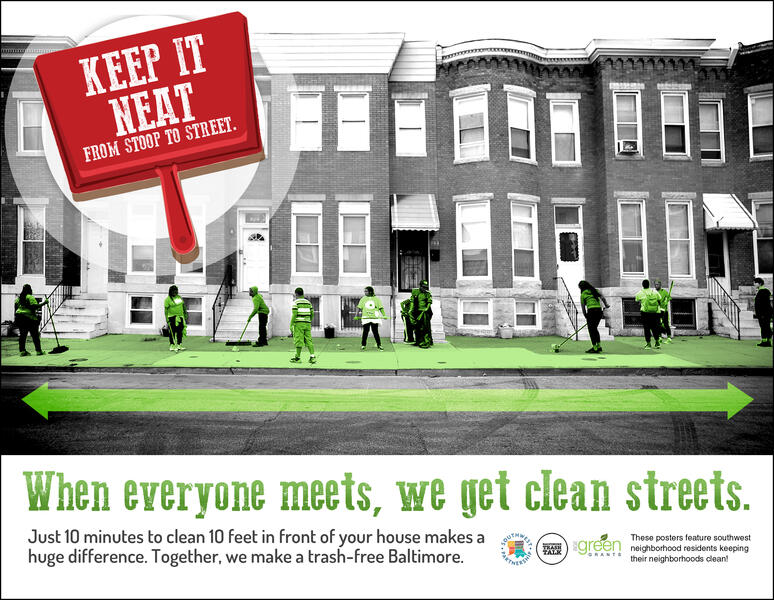 Keep it neat - When Everyone Meets (Street Scene)
Keep it neat - When Everyone Meets (Street Scene) -
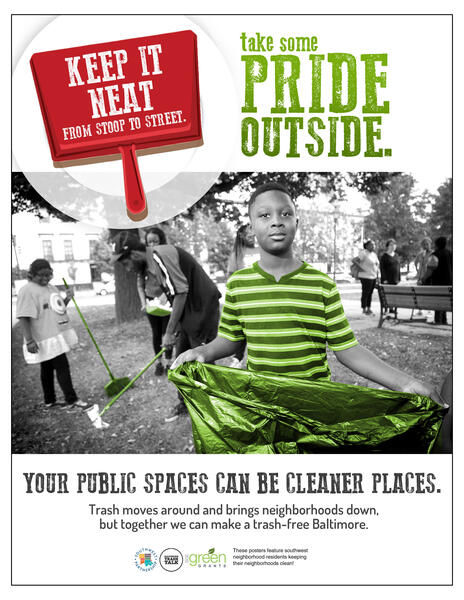 Keep it neat - Pride OutsidePoster encouraging investment in our public spaces.
Keep it neat - Pride OutsidePoster encouraging investment in our public spaces. -
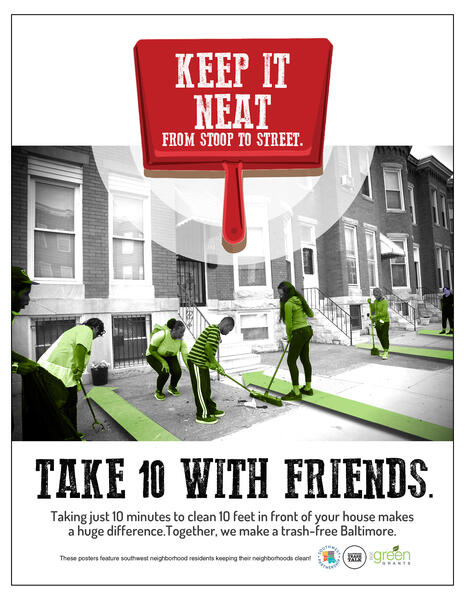 Keep it neat - Take 10 with FriendsPoster encouraging cleaning up with friends.
Keep it neat - Take 10 with FriendsPoster encouraging cleaning up with friends. -
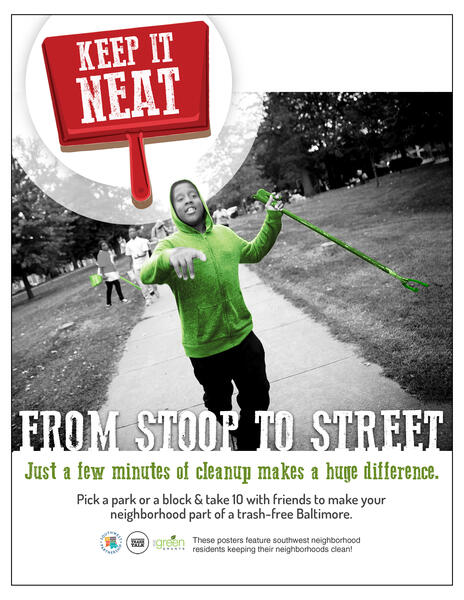 Keep it neat - Featuring Our Youth
Keep it neat - Featuring Our Youth -
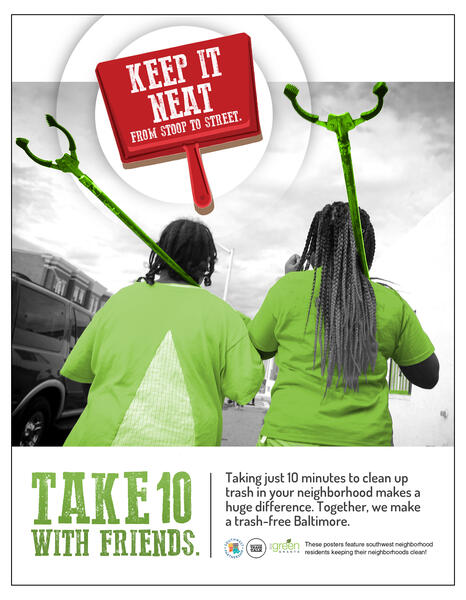 Keep it neat - Featuring Our Youth
Keep it neat - Featuring Our Youth -
 Take 10 Feet and Keep it NeatTake 10 Feet and Keep it Neat
Take 10 Feet and Keep it NeatTake 10 Feet and Keep it Neat -
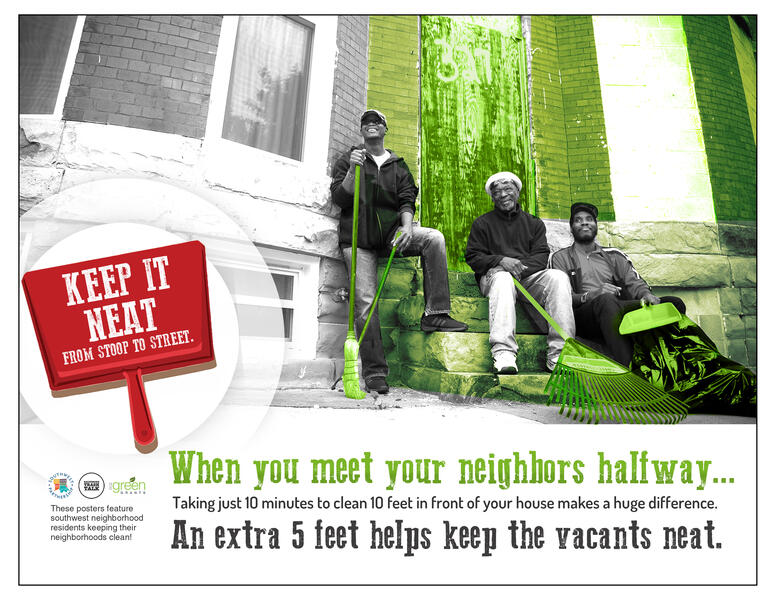 Keep it neat - Care for Our VacantsPoster focusing on joining with neighbors in keeping areas in front of vacants neat.
Keep it neat - Care for Our VacantsPoster focusing on joining with neighbors in keeping areas in front of vacants neat. -
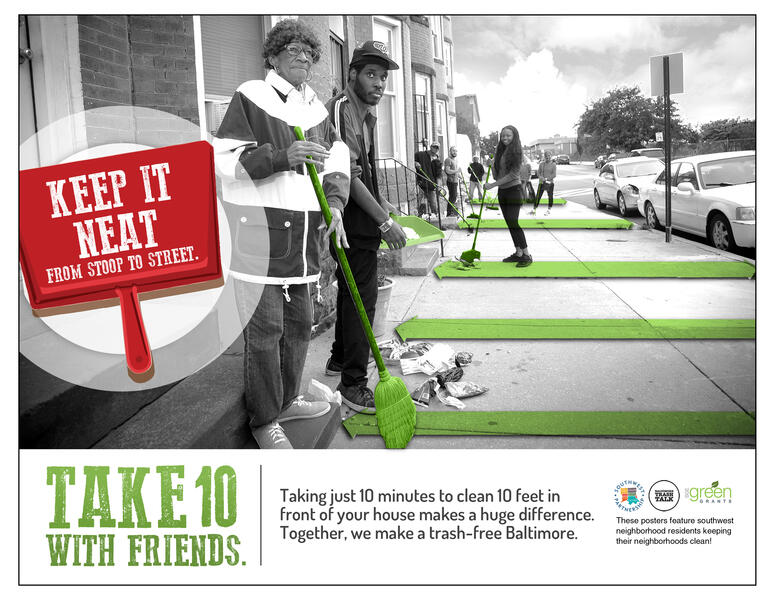 Keep it Neat - 10 with Friends Down the BlockPoster focusing on joining with neighbors on your block to clean up together.
Keep it Neat - 10 with Friends Down the BlockPoster focusing on joining with neighbors on your block to clean up together. -
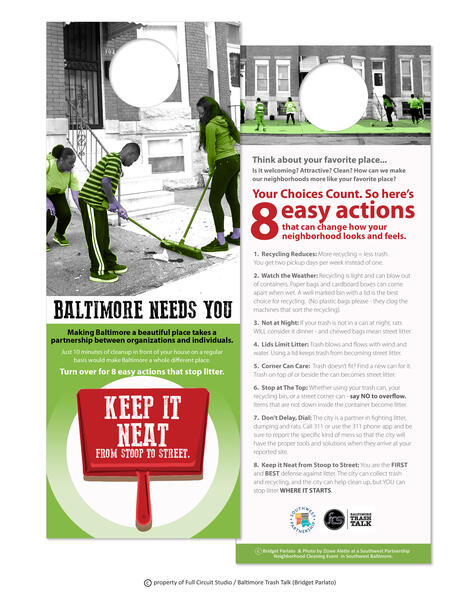 Door Hanger - Stoop to Street
Door Hanger - Stoop to Street -
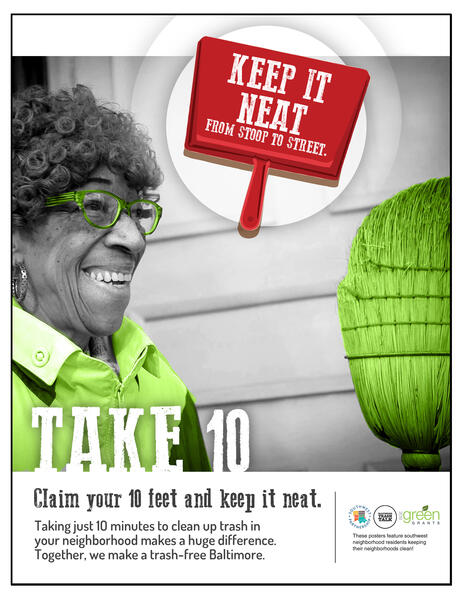 Keep it neat - Claim Your 10Keep it neat - Claim Your 10 focuses on a Neighborhood Hero known for taking care of her neighborhood for decades.
Keep it neat - Claim Your 10Keep it neat - Claim Your 10 focuses on a Neighborhood Hero known for taking care of her neighborhood for decades.
Pollinators and Neonicotinoids
Neonicotinoids are a class of insecticides chemically related to nicotine that act on receptors in the nerve synapse. They are toxic to insects, mammals, birds and other higher organisms. Marketed by European chemical giants Syngenta and Bayer, neonics are the most widely used insecticides both in the United States and globally. In a report released a year ago, the EPA basically conceded the case that these pesticides harm bees and other pollinators. They still remain on the market.
-
Parlato Pollinator Bird and Neonicotinoid Detail.JPGDrawing of a dead bird and a Neonicotinoid molecule. Neonicotinoids are a class of insecticides chemically related to nicotine that act on receptors in the nerve synapse. They are toxic to insects, mammals, birds and other higher organisms. Marketed by European chemical giants Syngenta and Bayer, neonics are the most widely used insecticides both in the United States and globally. In a report released a year ago, the EPA basically conceded the case that these pesticides harm bees and other pollinators. They still remain on the market.
-
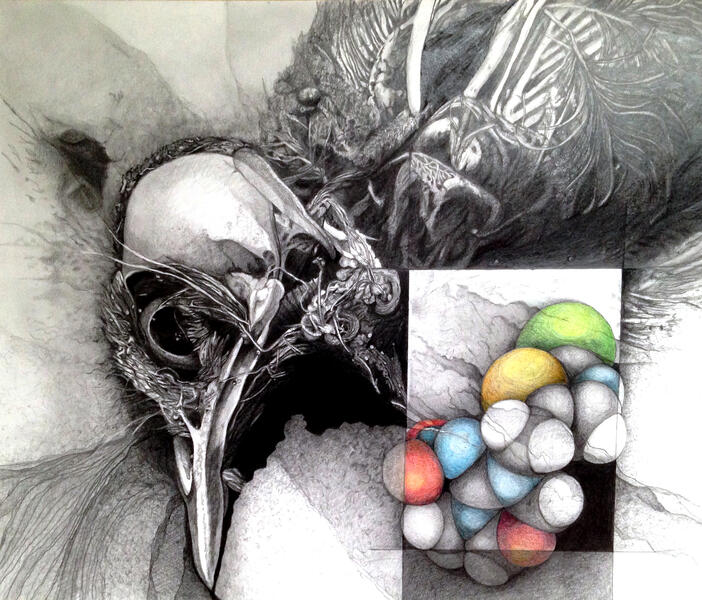 Dead Bird and Neonicotinoid MoleculeDead Bird and Neonicotinoid Molecule
Dead Bird and Neonicotinoid MoleculeDead Bird and Neonicotinoid Molecule -
Parlato Pollinator Bird Feet and Neonicotinoid.JPGDrawing of a dead birdand a Neonicotinoid molecule. Neonicotinoids are a class of insecticides chemically related to nicotine that act on receptors in the nerve synapse. They are toxic to insects, mammals, birds and other higher organisms. Marketed by European chemical giants Syngenta and Bayer, neonics are the most widely used insecticides both in the United States and globally. In a report released a year ago, the EPA basically conceded the case that these pesticides harm bees and other pollinators. They still remain on the market.
-
Parlato Pollinator - Bird Feet DetailDetail - Drawing of a dead bird and a Neonicotinoid molecule. Neonicotinoids are a class of insecticides chemically related to nicotine that act on receptors in the nerve synapse. They are toxic to insects, mammals, birds and other higher organisms. Marketed by European chemical giants Syngenta and Bayer, neonics are the most widely used insecticides both in the United States and globally. In a report released a year ago, the EPA basically conceded the case that these pesticides harm bees and other pollinators. They still remain on the market.
-
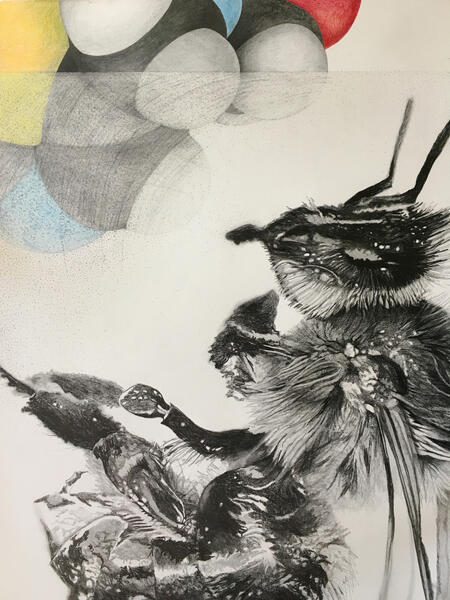 Bee Drawing (In Progress)Drawing of a dead bee and a Neonicotinoid molecule. Neonicotinoids are a class of insecticides chemically related to nicotine that act on receptors in the nerve synapse. They are toxic to insects, mammals, birds and other higher organisms. Marketed by European chemical giants Syngenta and Bayer, neonics are the most widely used insecticides both in the United States and globally. In a report released a year ago, the EPA basically conceded the case that these pesticides harm bees and other pollinators. They still remain on the market.
Bee Drawing (In Progress)Drawing of a dead bee and a Neonicotinoid molecule. Neonicotinoids are a class of insecticides chemically related to nicotine that act on receptors in the nerve synapse. They are toxic to insects, mammals, birds and other higher organisms. Marketed by European chemical giants Syngenta and Bayer, neonics are the most widely used insecticides both in the United States and globally. In a report released a year ago, the EPA basically conceded the case that these pesticides harm bees and other pollinators. They still remain on the market. -
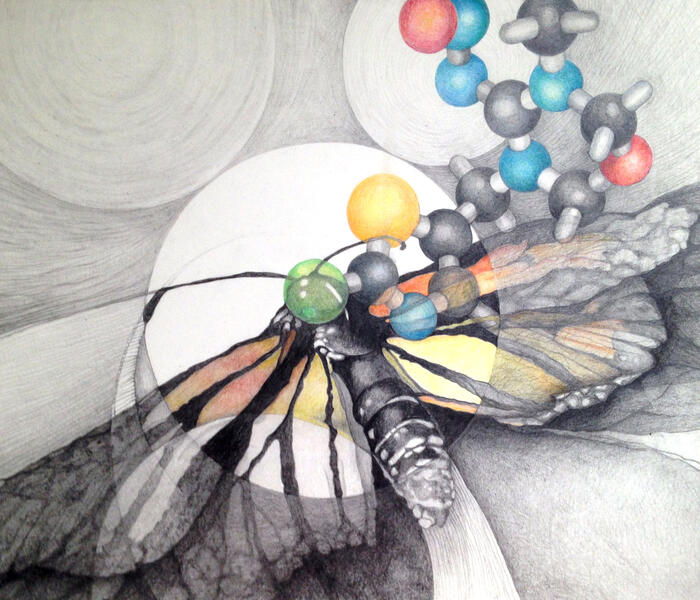 Parlato Pollinator bird 2.jpgDrawing of a dead bird and a Neonicotinoid molecule. Neonicotinoids are a class of insecticides chemically related to nicotine that act on receptors in the nerve synapse. They are toxic to insects, mammals, birds and other higher organisms. Marketed by European chemical giants Syngenta and Bayer, neonics are the most widely used insecticides both in the United States and globally. In a report released a year ago, the EPA basically conceded the case that these pesticides harm bees and other pollinators. They still remain on the market.
Parlato Pollinator bird 2.jpgDrawing of a dead bird and a Neonicotinoid molecule. Neonicotinoids are a class of insecticides chemically related to nicotine that act on receptors in the nerve synapse. They are toxic to insects, mammals, birds and other higher organisms. Marketed by European chemical giants Syngenta and Bayer, neonics are the most widely used insecticides both in the United States and globally. In a report released a year ago, the EPA basically conceded the case that these pesticides harm bees and other pollinators. They still remain on the market. -
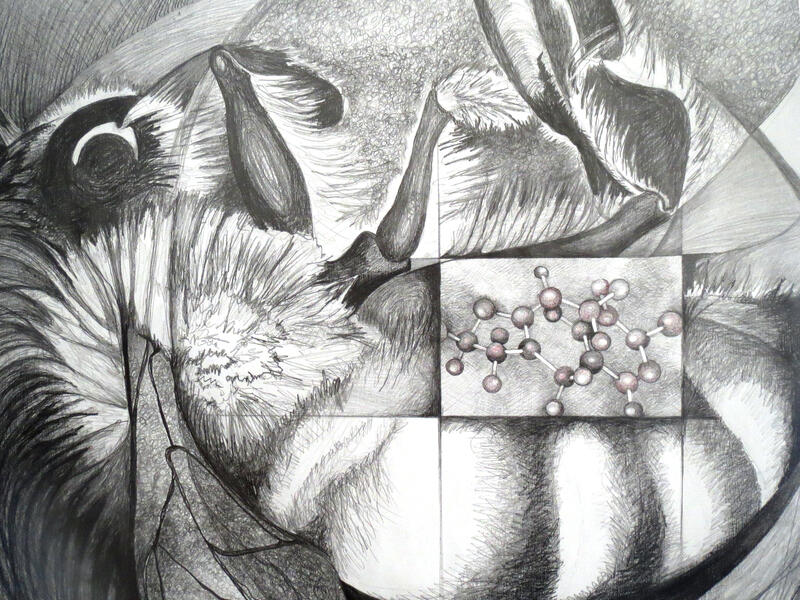 Parlato Pollinator Bee and Neonicotinoid.jpgDrawing of a dead bee and a Neonicotinoid molecule. Neonicotinoids are a class of insecticides chemically related to nicotine that act on receptors in the nerve synapse. They are toxic to insects, mammals, birds and other higher organisms. Marketed by European chemical giants Syngenta and Bayer, neonics are the most widely used insecticides both in the United States and globally. In a report released a year ago, the EPA basically conceded the case that these pesticides harm bees and other pollinators. They still remain on the market.
Parlato Pollinator Bee and Neonicotinoid.jpgDrawing of a dead bee and a Neonicotinoid molecule. Neonicotinoids are a class of insecticides chemically related to nicotine that act on receptors in the nerve synapse. They are toxic to insects, mammals, birds and other higher organisms. Marketed by European chemical giants Syngenta and Bayer, neonics are the most widely used insecticides both in the United States and globally. In a report released a year ago, the EPA basically conceded the case that these pesticides harm bees and other pollinators. They still remain on the market. -
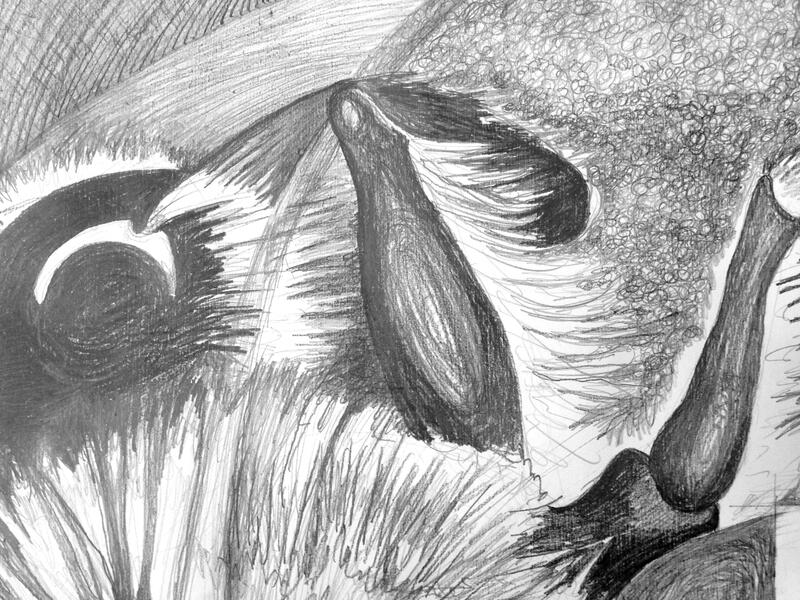 Parlato Pollinator Bee and Neonicotinoid Detail.jpgDrawing of a dead bee and a Neonicotinoid molecule. Neonicotinoids are a class of insecticides chemically related to nicotine that act on receptors in the nerve synapse. They are toxic to insects, mammals, birds and other higher organisms. Marketed by European chemical giants Syngenta and Bayer, neonics are the most widely used insecticides both in the United States and globally. In a report released a year ago, the EPA basically conceded the case that these pesticides harm bees and other pollinators. They still remain on the market.
Parlato Pollinator Bee and Neonicotinoid Detail.jpgDrawing of a dead bee and a Neonicotinoid molecule. Neonicotinoids are a class of insecticides chemically related to nicotine that act on receptors in the nerve synapse. They are toxic to insects, mammals, birds and other higher organisms. Marketed by European chemical giants Syngenta and Bayer, neonics are the most widely used insecticides both in the United States and globally. In a report released a year ago, the EPA basically conceded the case that these pesticides harm bees and other pollinators. They still remain on the market. -
Dead Bees and Neonicotinoid Molecule (In Progress)Drawing of a dead bee and a Neonicotinoid molecule. Neonicotinoids are a class of insecticides chemically related to nicotine that act on receptors in the nerve synapse. They are toxic to insects, mammals, birds and other higher organisms. Marketed by European chemical giants Syngenta and Bayer, neonics are the most widely used insecticides both in the United States and globally. In a report released a year ago, the EPA basically conceded the case that these pesticides harm bees and other pollinators. They still remain on the market.

